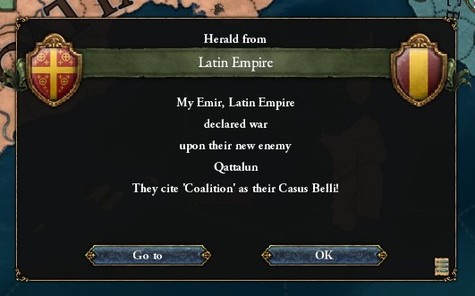Part 63: The Rise of Tirruni
Sorry for the long chapter, but I want to get EU4 done in one update, so here we go.Chapter 31 - The Rise of Tirruni - 1810 to 1821
From Gharbia in the west to Japan in the east, the fires of the Revolution burn hotter than ever, with wars raging and armies clashing and thousands dying in every corner of the earth. There was no hope of crushing the ideals of the revolution now, with the monarchies of the old world instead focused on tearing down the republican empire created by Grim Torgeir, at any and all costs.

Just before Europe exploded into a bloodbath, however, war broke out between the Tlapanec Empire and the Ibrizi Republic in the far west. The natives had retaliated to the constant Ibrizi raids by formally declaring war, a foolish choice on their part, as that was exactly what the Muslim revolutionaries were hoping for.

Across the width of the Atlantic and Indian Oceans, meanwhile, an era-defining war on the Arabian peninsula came to an end. The young and nascent Sharifian Caliphate had managed to crush the inferior armies of Musqat, forcing its sultan to recognise the authority of Medina and demanding huge land concessions. With that, almost the entirety of Arabia is united under the Shia Caliphate, turning it into the largest empire to rule in the peninsula for centuries.


But the ambitions of the khalifa were not yet sated. Turning his eyes to greater empires, the king of Arabia declared war on the Sunni Khwarezmian Empire early in 1810, determined to seize it’s Arab territories and plunder the rich cities lining the Persian Gulf.

To the immediate north, on the other hand, another war had only just come to an end. Whilst the forces of Crusader Egypt and the Vali Emirate had initially overrun large parts of Anatolia, Sultan Avedis Vakhtani had managed to regroup and slowly push them back into the Levant, holding his line at the Tauras Mountains.
And after attempting and failing to break this line over the course of another year, the Egyptian-Vali alliance was forced to make peace, ending the war with the territories they’d already captured and held.

Mere days after the conclusion of this war, the king of Egypt met his demise in what was described as a tragic accident. Fortunately, his young son had just came of age, quickly coronated in a grand ceremony in Alexandria.
Apanoub XIII was just as ambitious as his predecessors, but the harsh mountains and distant cities of Anatolia didn’t interest him. Instead, he wanted to further involve himself in the affairs of Europe, leading to the youngster publicly declaring the Almoravid Sultan his rival and enemy a few weeks into his reign.


The young king quickly came under a lot of criticism, but Apanoub was no fool, he knew that he could not match the global empire of the Almoravids just yet. So he shifted his attention southward first, where his ancestors had already managed to conquer large parts of the Sudan.
An impressive feat, but the Egyptians had not yet achieved their grand aspirations: to locate the source of the Nile, bringing the entirety of its basin under their control. That said, many suspected that the great river originated somewhere in the Ethiopian mountains, leading to King Apanoub declaring war on the Ethiopian Empire in the summer of 1810.

Further west, meanwhile, Marrakesh was plunged into mourning when the widely-beloved Sultan Issam died after contracting an illness in his army camps. Having fathered no sons, the Sultan was succeeded by his brother, the equally-talented and accomplished Yahya.

Unlike his more military-inclined brother, Yahya was bent on seeing his massive empire prosper and flourish before all else, and the early months of his reign saw the campaign in Gharbia come to a swift and successful end. The natives were forced to cede yet more land to the Almoravid Empire, with the Sultan founding another colonial subject to govern in the newly-conquered regions.

Even with the Gharbian war at an end, however, the Berbers were still embroiled in another conflict. To the north, France had launched an invasion of the Mahdiyah, their close ally and puppet in Iberia. The Almoravids could not allow that to stand, of course, so Sultan Yahya pledged his forces to the defense of the Mahdi and his territories.
And fortunately for the Muslims, the French would not be able to devote their full resources to the war, as the Second Coalition had just declared war on Revolutionary Bavaria to their east. And to make matters worse, Sahim Tirruni - Grand Vizier of Revolutionary Qattalun - also pounced on France, surrounding the kingdom by enemies in every direction.

As though the French were not in enough trouble, another crisis hit Paris late in the year when King Adhémar died in his sleep. The old king had not fathered any sons, but his wife in Queen Aliç managed to emerge from the ensuing succession struggle victorious, naming herself Queen-Regent until her only daughter came of age.

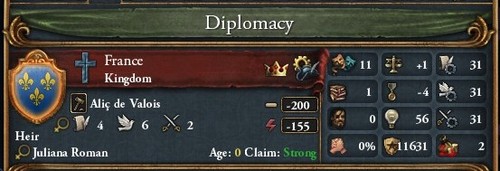
In the east, the War of the Second Coalition was off to a rocky start, with Revolutionary armies gaining the upper hand in a series of early skirmishes. The first true battle of the war, however, didn’t break out until late in December, and that didn’t end nearly as well.
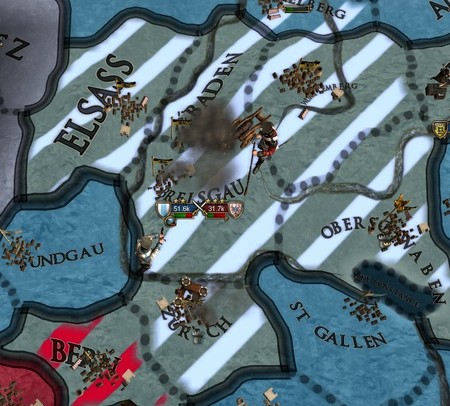
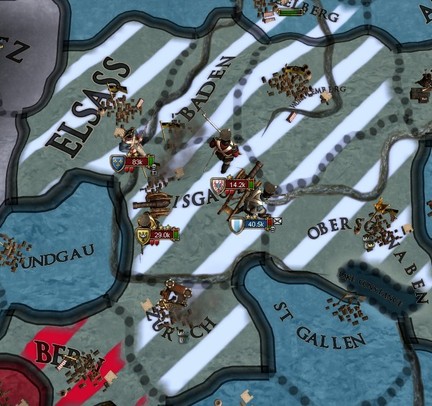
Led by the Duke of Brunswick, the united Monarchist-German army engaged a large Bavarian force in the defensible terrain of Breisgau, with the battle only ending after five hours of thick, heavy fighting. A decisive victory allowed German forces to quickly lay siege to fortresses in Bohemia and Silesia, whilst the French pushed into and captured vast tracts of Swabia from the west.
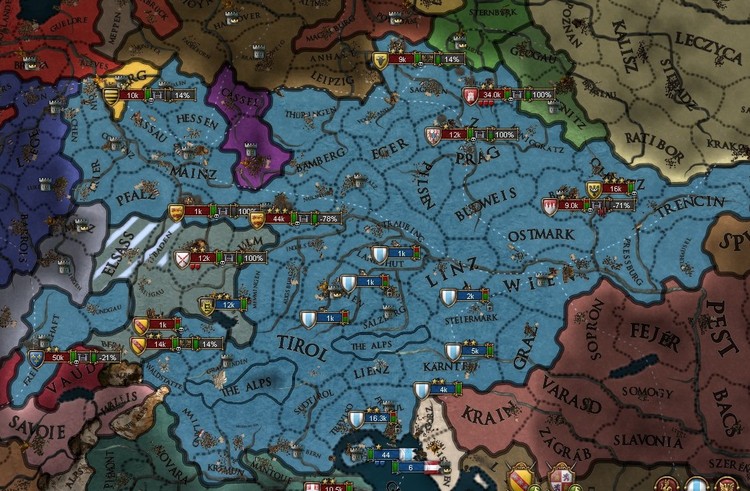
And Bavaria’s problems didn’t end there. Corruption and duplicity were rampant in München, and with the death of Grim Torgeir, a huge battle to become his successor broke out in the streets of the capital. All of this left the Revolutionary armies severely under-funded and weaker than ever, with desertion now becoming a common occurrence, especially after the disastrous battle of Breisgau.
Needless to say, the immediate prospects of Bavaria weren’t looking too good.
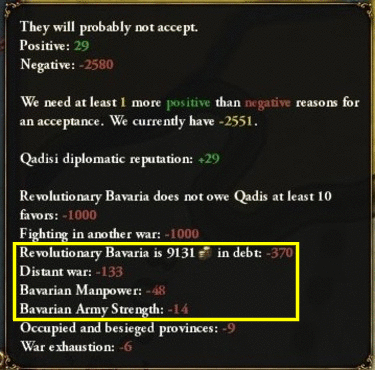
Finally moving to Iberia, however, the Grand Vizier of the Majlis saw all this chaos as nothing but an opportunity - both to expand and showcase his talents on the battlefield. So immediately after the outbreak of the revolutionary war, Ibn Timu declared a war of his own on the prince of Castille, determined to finally conquer its remnants in Galicia.
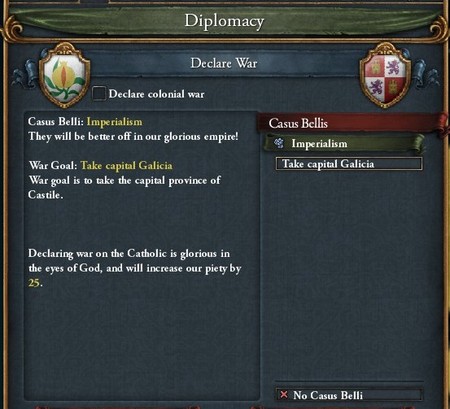
Personally leading the Majlisi Guard into Galicia, the ensuing battle was little more than a massacre, with Ibn Timu’s forces quickly defeating the numerically-inferior and poorly-equipped Castilian army.
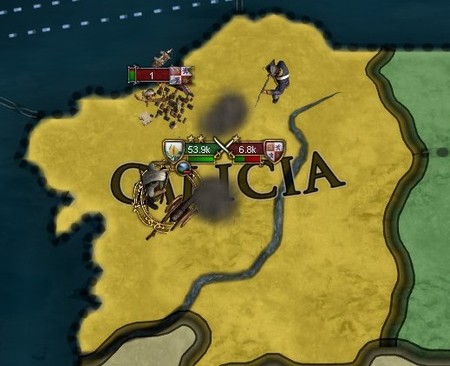
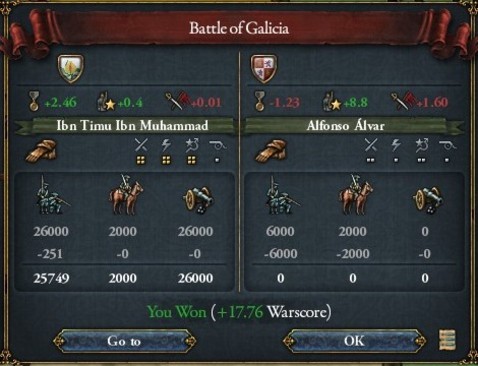
From there, they went on to seize countless villages and towns dotting the north coast, whilst a larger force surrounded and blockaded the fortress of Galicia. The siege stretched out for almost seven months before the defending garrison finally ran out of supplies, negotiating the surrender of Galicia on the condition that they be spared.
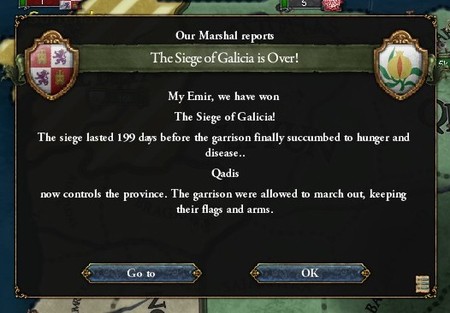
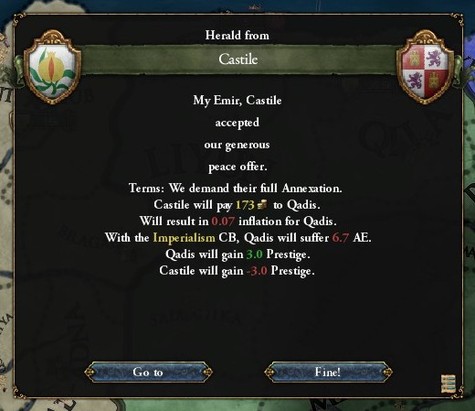
Ibn Timu graciously accepted their surrender, and after installing his son as the new governor of Galicia, the Grand Vizier launched another campaign eastward. After securing military access from the Mahdi, the Majlisi Guard marched along the northern coast of Iberia towards France, coming to a halt upon reaching Navarra.
There, the Grand Vizier simply observed as a large French force descended on the forces of the Mahdi, which were laying siege to a local fortress. With the help of Moroccan reinforcements, the Mahdist army managed to throw back the French relief force, taking relatively light losses as they did so.
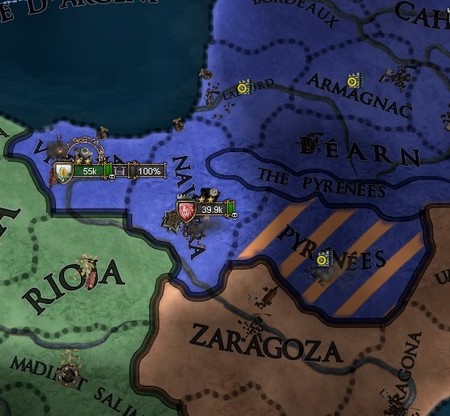
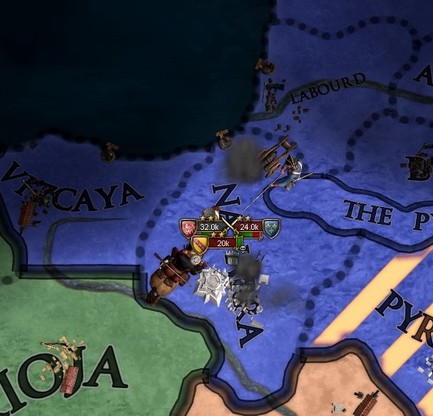
With the Mahdi now focused on capturing Navarre, Ibn Timu decided to march further north, crossing the Pyrenees early in 1811 and finally pushing into French territory. Dividing his forces into two halves, Ibn Timu himself lay siege to the critical fortress of Cahors with one army, whilst the other half of his forces began capturing villages and cities further south.
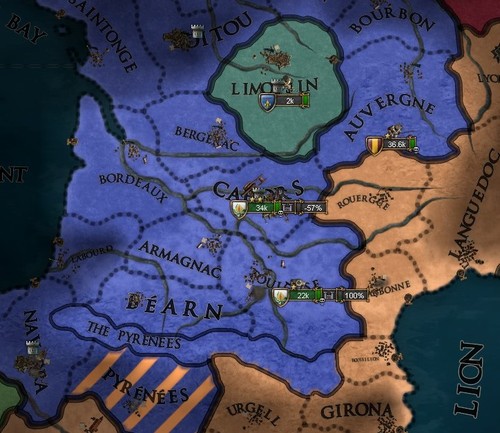
The Majlisi campaign was off to a good start, but the same could not be said for the Bavarians. Over the first three months of 1811, the Revolutionary armies lost no less than three large-scale battles, one of which was against the forces of Duke August Wilhelm of Brunswick, another against a large French army in the west, and the last against a massive 100,000-strong monarchist army not far from Nürnberg.
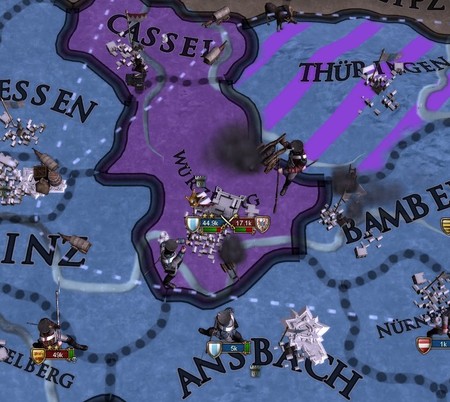
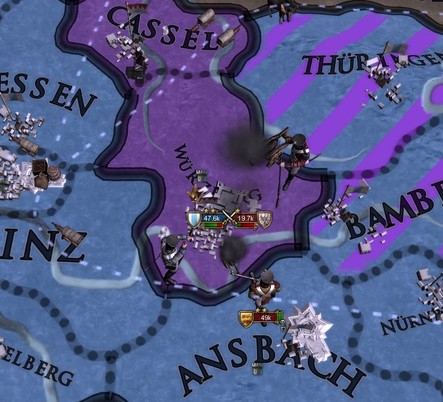
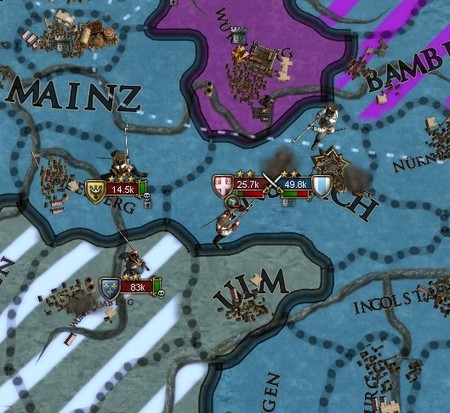
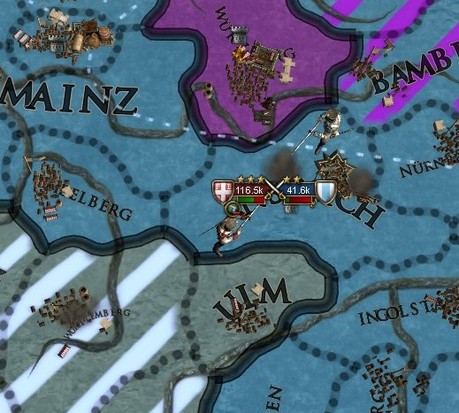
As a result, Bavarian forces were forced to fall back, giving up their puppet republics and border territories for lost. Tens of thousands had already died on the front lines, but carnage still reigned supreme in München, with practically no hope of raising new armies whilst the Republic was leaderless and bankrupt.
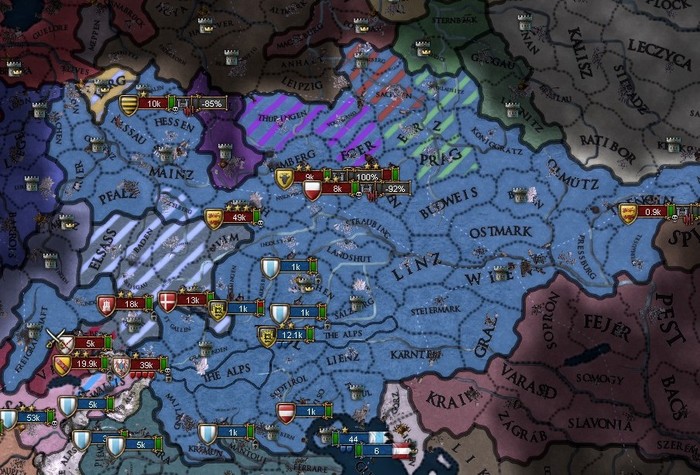
To their immediate east, meanwhile, another Rurikid rose to the Tsardom of Smolensk. Despite being an able administrator and diplomat, Dobroslava was zealously anti-Revolutionary, and her first promises in her traditional coronation speech were to single-handedly crush the Bavarian Revolution and see every last Radical executed.
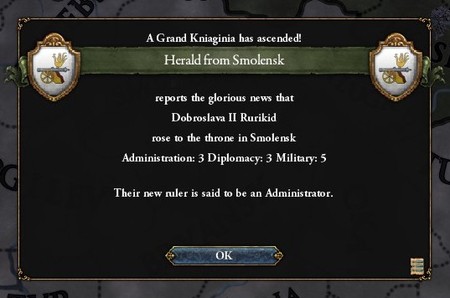
And true to her word, scarcely a month had passed before Smolensk formally declared war on Revolutionary Bavaria, with tens of thousands of Russians pouring into the Republic’s eastern territories. Diplomats were immediately dispatched to Qadis, of course, with the Majlis vowing to do all they could to stymie the monarchist advance.
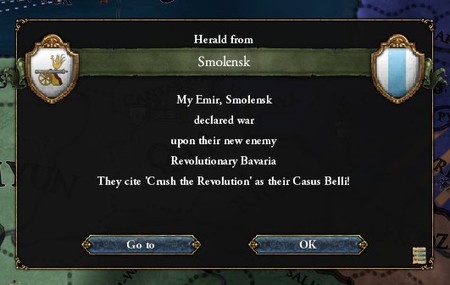
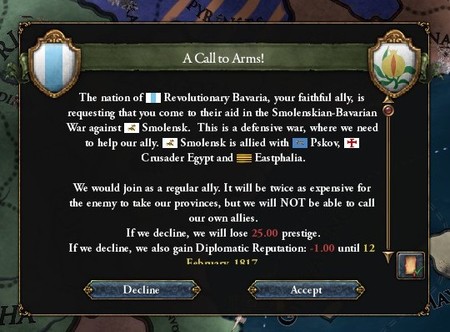
The War of the Second Coalition now swept across the entirety of Europe, raging from the Bay of Cádiz to the Ural Mountains, involving powers great and small, and promising to utterly and irrevocably change the face of the continent.
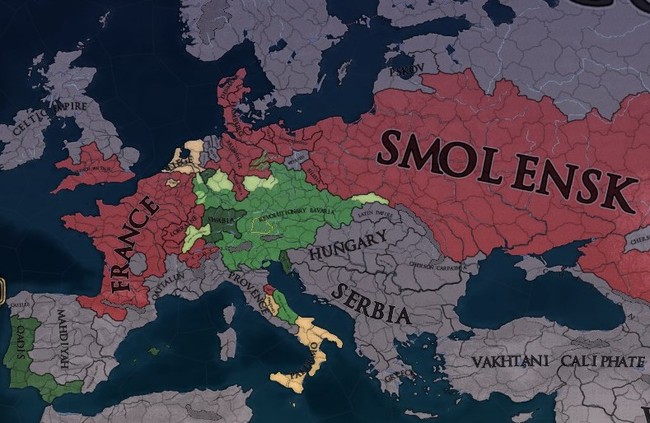
Back in southern France, meanwhile, Andalusi scouts sighted a smaller French army, which the Grand Vizier aggressively pursued into the hills of Rouergue, where he managed to pin them down. A short and one-sided battle then followed, with Ibn Timu cleverly surrounding and destroying the entirety of the French force.
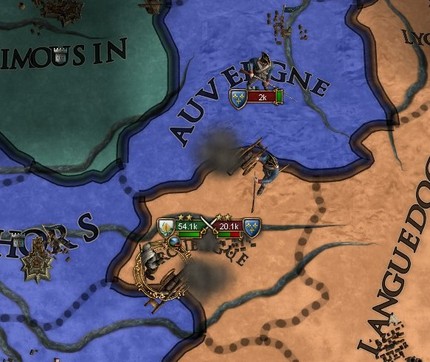
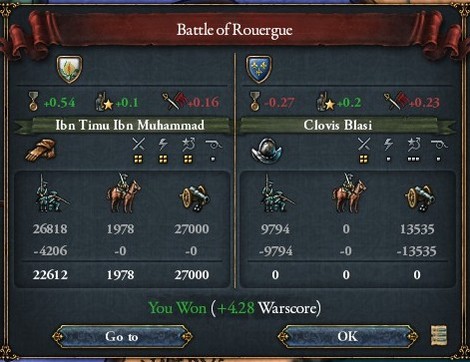
A relief force arrived a few hours later, and despite it being much smaller than the Majlisi Guard, Ibn Timu managed to coerce it into launching an ill-advised attack. And for the second time in less than a day, Ibn Timu managed to encircle and crush almost the entirety of the opposing army, chaining and imprisoning the few who weren’t killed in the heat of battle.
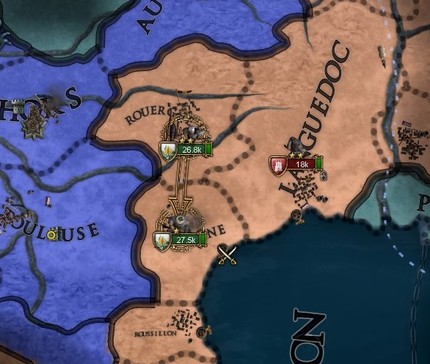
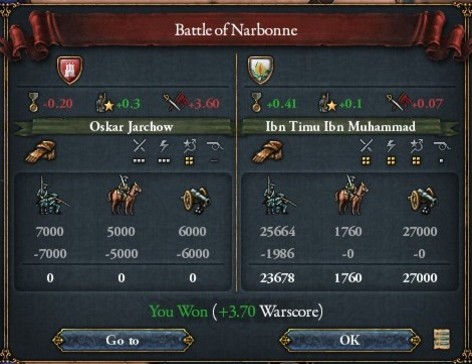
Southern France now lay open, but the forces of Sahim Tirruni had laid siege to Cahors, leaving only one other route open to the Majlisi Guard. Ibn Timu thus led his army even further north and, after breaching its walls within the month, managed to capture the Burgundian capital of Charolais.
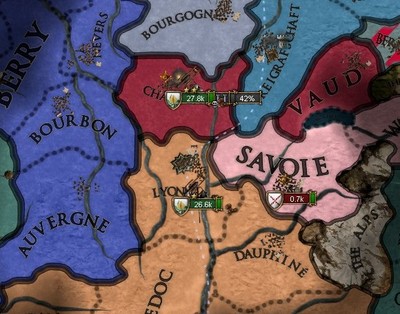
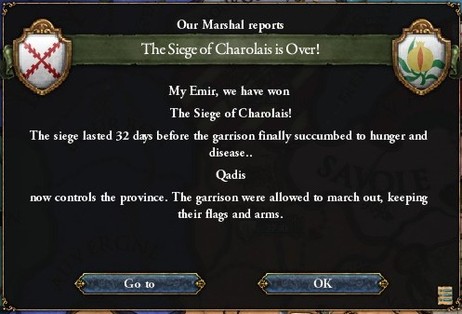
Back in Iberia, on the other hand, word reach the Majlis that a large Lorrainian army had disembarked just off the coast of Galicia. Quickly capturing the damaged fortress at Shant Yakub, along with the cities and towns surrounding it, the invading army then began the march southward.
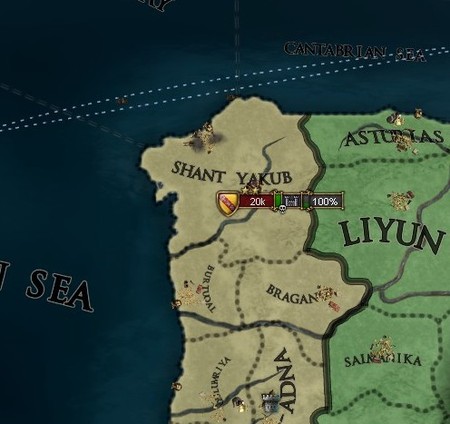
Further complicating matters was the outbreak of a large Portuguese revolt a few months later, and as the riots in Porto quickly escalated into rebellion, the rebels captured and lynched the local governor appointed by Ibn Timu. Determined to avenge the massacre they’d suffered a few years later, the rebels then began spreading out to capture nearby towns, mercilessly slaughtering anyone and everyone they came across.
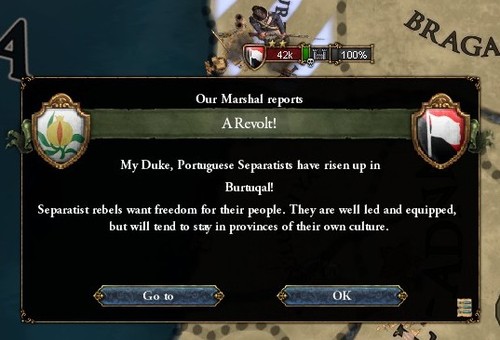
Deep into France, however, these rising tensions were far too distant for Ibn Timu to take any notice. The Grand Vizier was far more focused on the oncoming German army, led by the capable and battle-proven Duke August-Wilhelm, who attacked the Majlisi Guard at Berry late in 1811.
Ibn Timu had been studying the local terrain, however, and managed to use local rivers and streams to great advantage. After three hours of heavy fighting, the Germans were forced to abandon the battle with heavy casualties, losing more than three times as many men as the Majlisi Guard had.
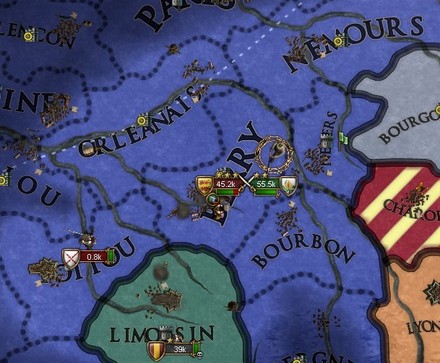
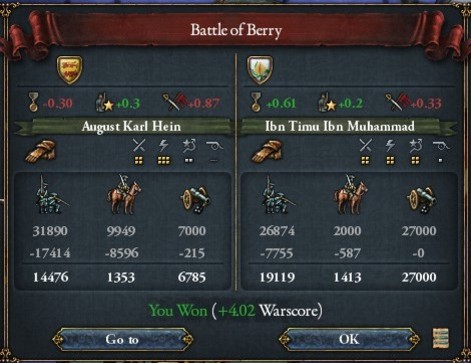
Whilst Ibn Timu was wracking up the victories in the north, the Mahdist Army had finally managed to breach the walls of Navarra, capturing the fortress after almost two years of siege. North of the Pyrenees, Sahim Tirruni and his revolutionaries also met with success, pouring into Cahors after a defecting guardsman opened the gates to them.
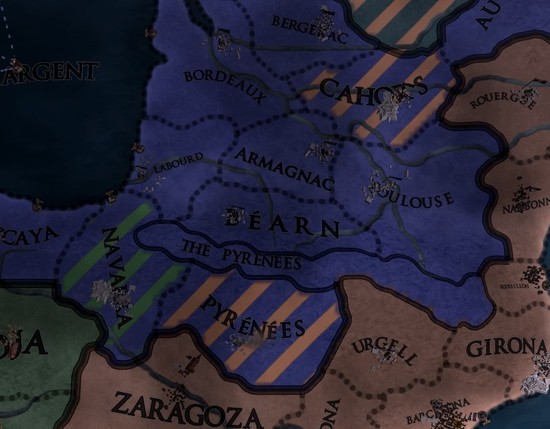
Unfortunately for them, however, the king of Provence chose this moment to declare war on Revolutionary Catalonia. Sahim Tirruni was thus forced to divide his forces, leaving some 20,000 men behind to garrison his captured territories whilst the vast majority went east with him, determined to repel the Provencal invasion.
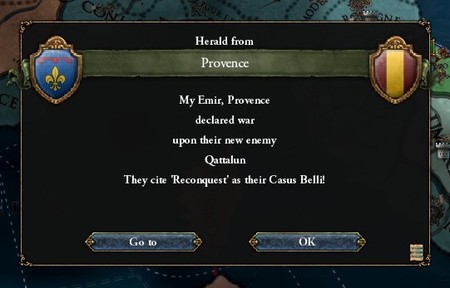
This was of little consequence to Ibn Timu, however, who was focused on capturing the vital fort of Poitou - the bridge between northern and southern France. Whilst his artillery was blowing at the walls of the fortress, however, another Brunswickian army descended on the Majlisi Guard, with Duke Wilhelm eager to avenge his loss in Berry.
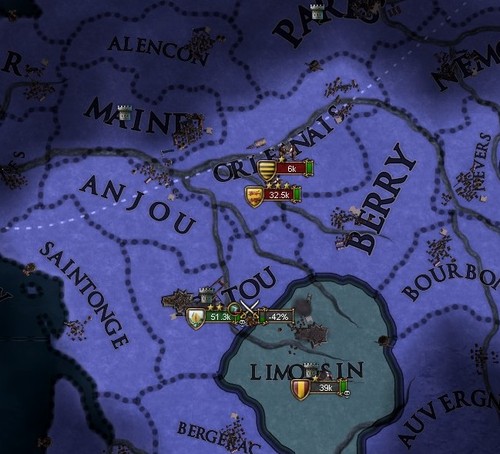
The Majlisi Guard was superior to the German army in both numbers and discipline, so Ibn Timu decided to meet the attack, swivelling his guns around to bombard the attackers whilst his infantry clashed into theirs. Less than an hour into the fighting, however, reinforcements began pouring southwards and onto the battlefield - twenty, then forty, then sixty thousand. And before he knew it, Ibn Timu had been tricked, outmanoeuvred into a disastrous engagement.
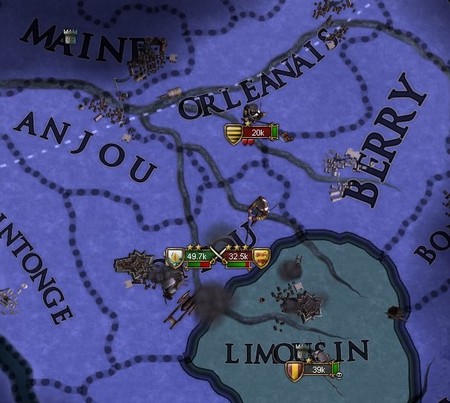
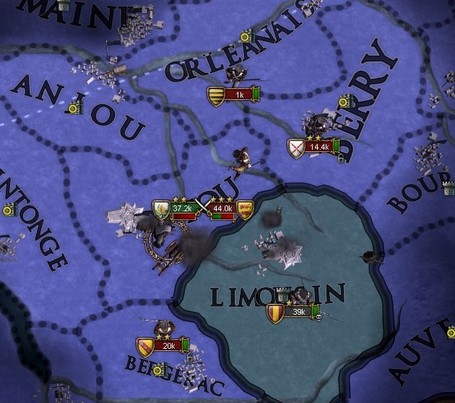
Facing the combined forces of Brunswick, Eastphalia and Savoy, the Majlisi Guard stood little chance of emerging victorious. All the same, Ibn Timu put up a dogged fight before finally calling for a retreat, ending the battle with roughly equal losses on both sides.
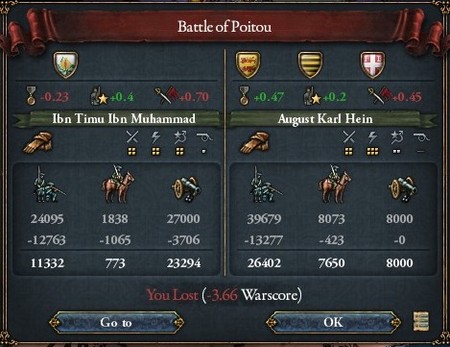
Forced to fall back to Navarra, the defeat did give messengers the opportunity to deliver news to Ibn Timu, who finally heard of the invasion of Qadis. So after giving his armies a few days rest, the general marched the Majlisi Guard southward and back into Iberia.
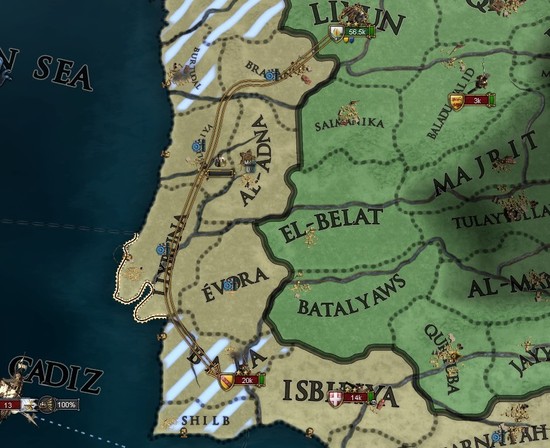
First and foremost, the Grand Vizier pushed towards Ishbiliya and engaged the larger Lorrainian-Savoyard army, which was threatening Qadis itself. Out of supply and with no hope of reinforcements, the ensuing battle could only end one way, with the Majlisi Guard killing and imprisoning the entirety of the enemy army - all 35,000 of them.
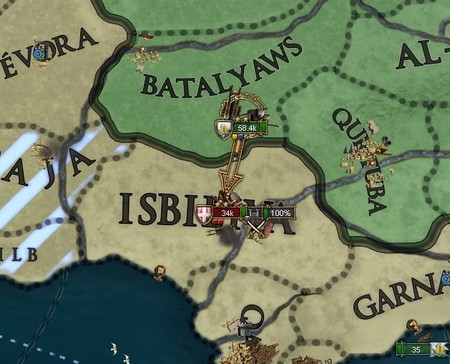

Sending the prisoners to Qadis for the Majlis to deal with, Ibn Timu then pushed eastward on a quick march, engaging another army besieging Granada. Like their allies in the west, the 15,000-strong Burgundian army had ventured too far south, and were quickly crushed in a short and bloody battle.
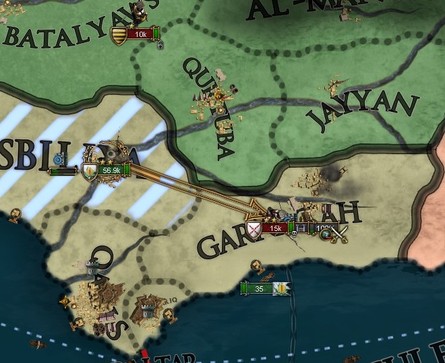
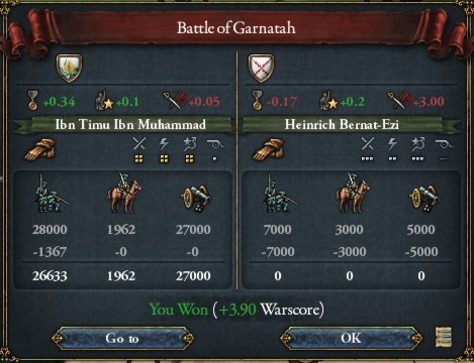
Further east, meanwhile, the forces of Revolutionary Qattalun had easily managed to repel the Provencal invasion. From there, Sahim Tirruni orchestrated a massive invasion of the Italian peninsula, capturing and occupying vast tracts of Provence - from Nice in the west to the gates of Rome itself.
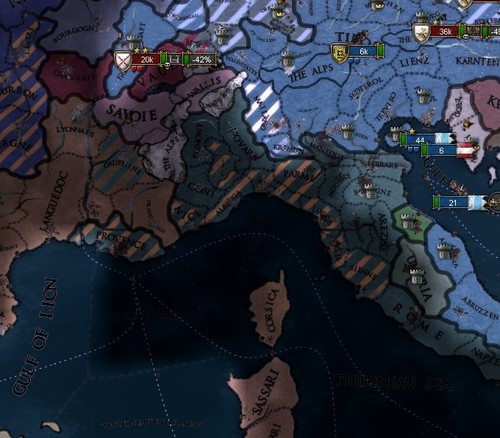
At the same time, almost the entirety of southern France was now under Muslim occupation, with the Mahdist-Almoravid army capturing the fortress of Bordeaux and laying siege to La Rochelle, whilst Qattaluni forces captured and plundered the rich cities of Auvergne and Bourbon.
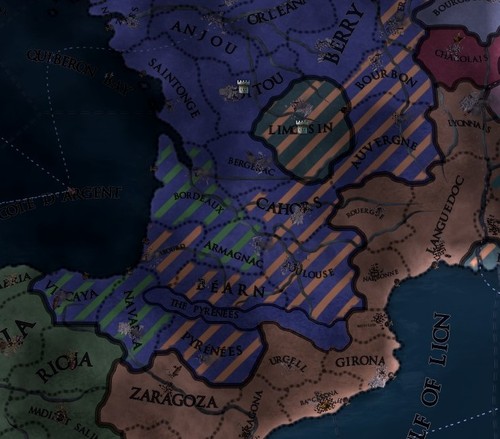
Ibn Timu’s reputation was beginning to suffer, with his neighbouring rivals marching from one glorious victory to the next whilst he settled for squashing tiny armies. Determined to prove himself their equal, the Grand Vizier hastened northward again, laying siege to Poitou for the second time before the end of 1813.
Once again, however, a large army arrived to relieve the fortress. This time facing 80,000 Frenchmen, Ibn Timu could do nothing but retreat after suffering colossal losses in the early hours of the battle, leaving behind 25,000 Andalusi littering the fields surrounding Poitou.
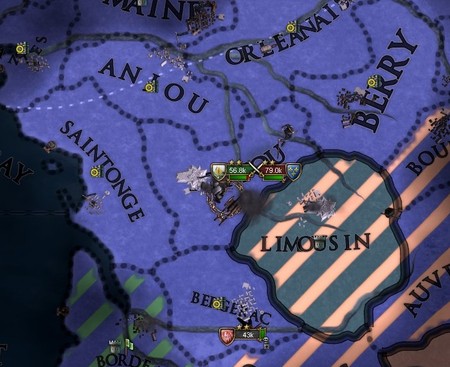
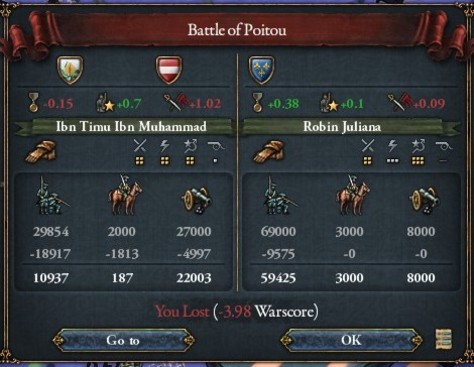
Recruiting a steady stream of farmboys to make up for the casualties, it wasn’t long before the general was ready to push north again, growing angrier and more humiliated by the day. And he had scarcely begun the third siege of Poitou before yet another French army arrived, dealing the Majlisi Guard another defeat, though this time they gave as good as they got.
This was not the best news for Ibn Timu, as unrest and tensions began rising in his camps and his officers began losing confidence in him. These defeats also solidified the resolve of the Majlis, who had already been opposed to him for years now, to depose and exile the rogue general.
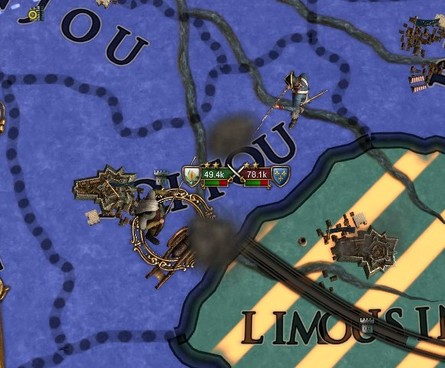
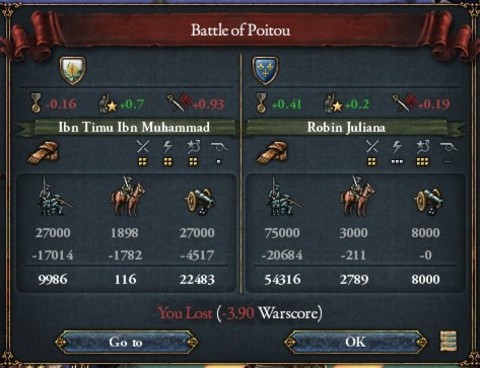
Whilst Ibn Timu led his shattered force to recuperate south of the Pyrenees, the Bavarians were not having much more success on the battlefield. A series of poor strategic decisions and ill-timed attacks saw the Revolutionaries drown in losses, suffering tens of thousands of deaths on the battlefield. The largest Bavarian army now numbered just 25,000 - not enough to repel the Germans alone, never mind the combined Catalan, French and Russian forces.
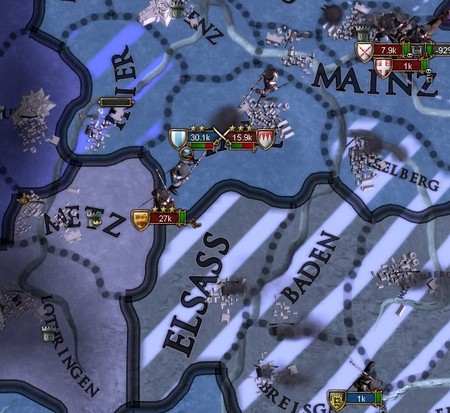
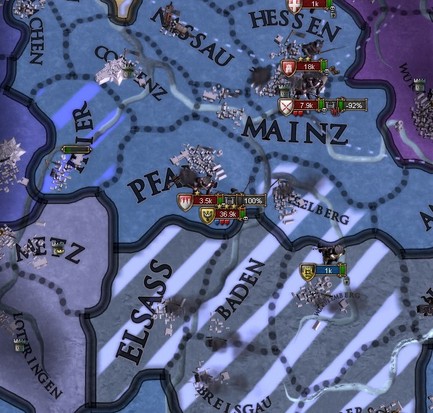
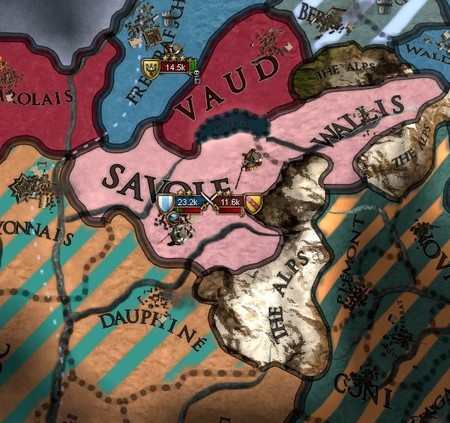
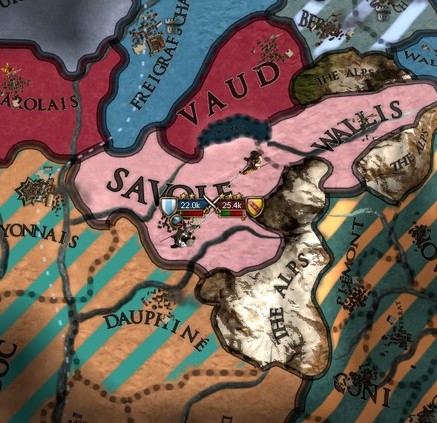
Unsurprisingly, large tracts of the Republic were quickly captured by monarchist armies over the next few months, with Bohemia, Swabia and Silesia all suffering under brutal occupation. The forces of Smolensk swept across the republic with almost no opposition, capturing all of Bavaria’s Polish possessions and a good chunk of Bohemia before the end of summer.
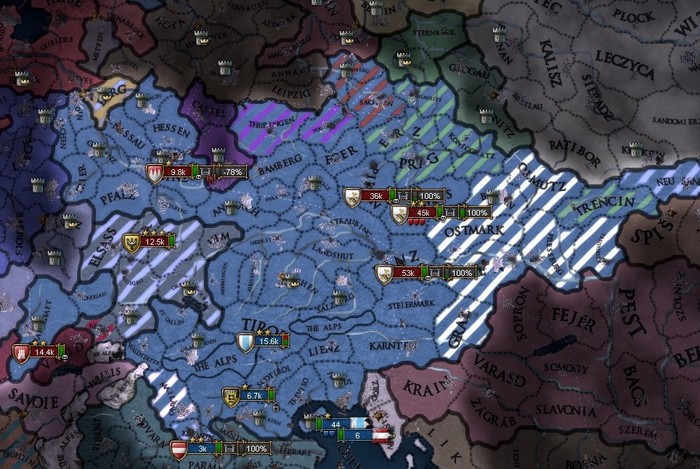
A lull in the revolutionary cause followed over the next few months, with Bavarian armies permanently crushed in the east and the Majlisi Guard recovering from its losses in the west. Whilst the monarchist cause advanced in Europe, however, the opposite was happening in Gharbia.
Prouder and stronger than ever, the Ibrizi Republic utterly crushed the Tlapanec Empire over the past few years, conquering and absorbing almost the entirety of its possessions before the end of 1813.
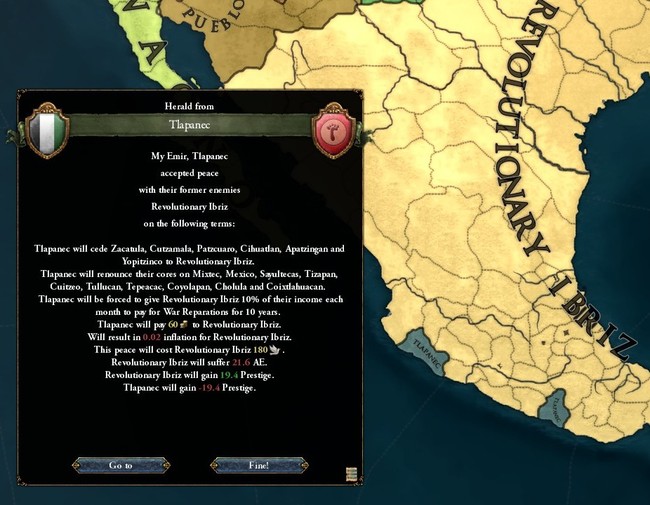
A short journey away, meanwhile, a new sultan rose to rule in the island of Yinabii. The heir to the Hishami dynasty, Sultan Husayn still claimed the mainland empire built by his forefathers, but he was also a realist, and thus began making moves to secure his position in the Caribbean.
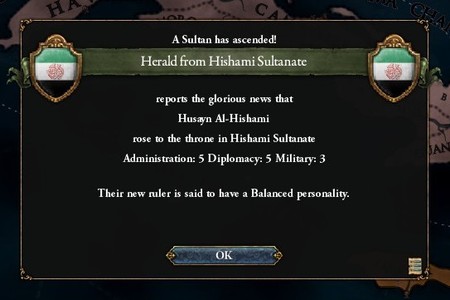
So over the next few months, his diplomats managed to negotiate an alliance with Al Qarbiya, another Andalusi successor state. Ruled by a small council of noble families, Al Qarbiya vowed to come to the defense of the Hishami should they be attacked by Ibriz, with Sultan Husayn promising to do the same.
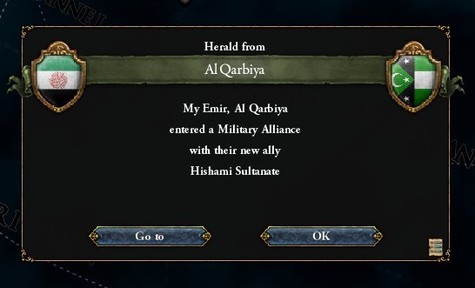
Husayn also began reforms to improve the economy and standing military of his island, and before long, his policies began paying off. Just a few months into his reign, however, a huge scandal broke out as the Sultan converted to Shia Islam - a huge departure from the status quo, as almost the entirety of his family were Sunni by faith.
Even today, historians are puzzled as to why Husayn converted, with the only plausible explanation being to establish a unique identity. As he ruled over a tiny stretch of land and had a tight grasp over the surviving members of his family, the Sultan quickly managed to eliminate any opposition to his conversion, forcing his advisors and supporters to do the same.
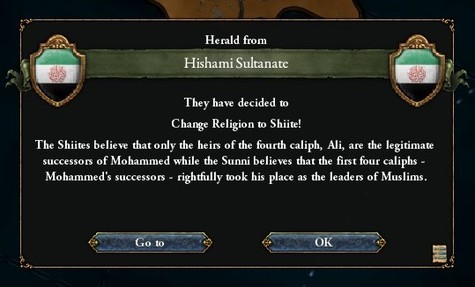
Across the width of the world, meanwhile, another bout of imperialism broke out in India. Sultan Yahya must’ve been confident that the war against France was all but won, because he began shifting his attention and resources to India, where he was determined to secure his possessions against raids from surrounding kingdoms.
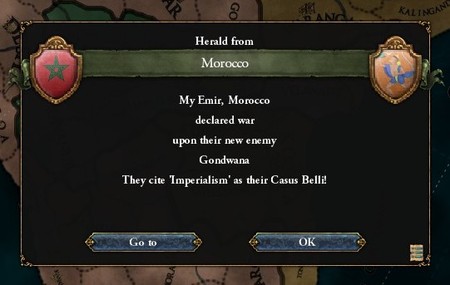
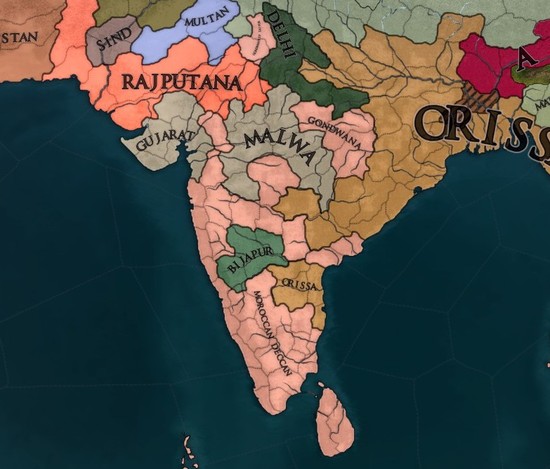
Across the Arabian sea, meanwhile, the Sharifian Caliphate emerged victorious from yet another successful war. Capturing Pirate Coast and forcing the Khwarem-Shah to pay tribute to Medina, this triumph only further solidified the khalifa’s status, forcing the nearby Vali Emirate and Yemenite sheikhdoms to formally recognise him.
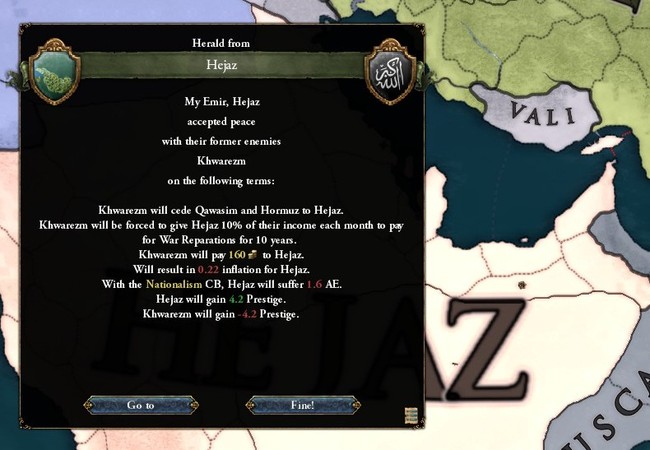
Whilst the Shia Caliphate was on the rise in the south, however, the Sunni Caliphate was in steep decline. In a desperate effort to at least look like he wasn’t embroiled in crisis, Sultan Avedis attempted to conquer the tiny island of Rhodes, a spit of land just off the Anatolian coast.
Rhodes had been ruled by as an independent sultanate since the 1400s, however, and they wouldn’t be surrendering their sovereignty anytime soon. Thus, after two of his expeditionary forces met with humiliating failure, the Vakhtani Caliph was forced to make peace with the Sultan of Rhodes.
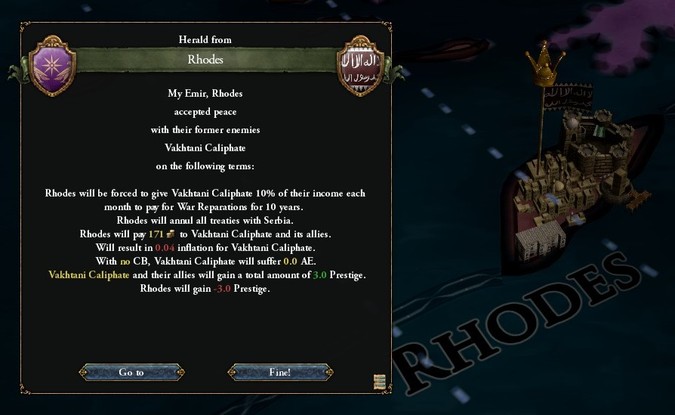
And to make matters worse, the Principality of Cherson declared war on him a few months later, seeking to establish supremacy over the Black Sea. With tens of thousands of soldiers now pouring into Anatolia from the north, the Armenian Empire seemed to be staggering from one crisis to the next, with its very existence now becoming doubtful.
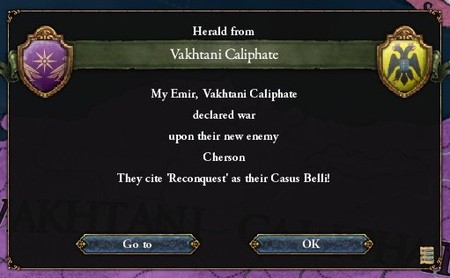
Across the Mediterranean, meanwhile, Sahim Tirruni had managed to solidify his hold over Italy. Having captured the entirety of his possessions save for the city of Rome, the king of Provence was forced to meet with the Revolutionary firebrand to begin peace negotiations.
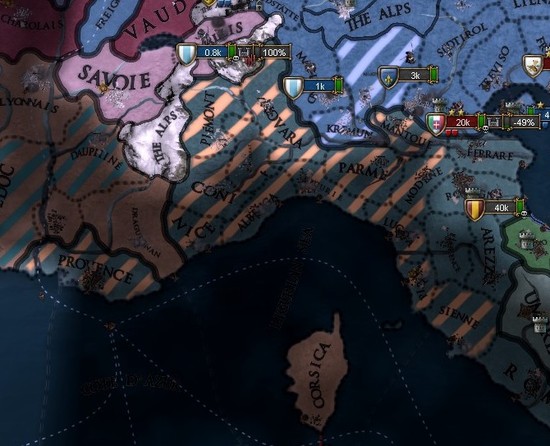
With his kingdom already lost, however, there would be very little negotiation on his part. The king was forced to cede vast tracts of land in north Italy, begin paying yearly tribute to Barshaluna, abandon any titles and honours relating to Provence, and effectively become a vassal to Sahim Tirruni and his revolutionaries.
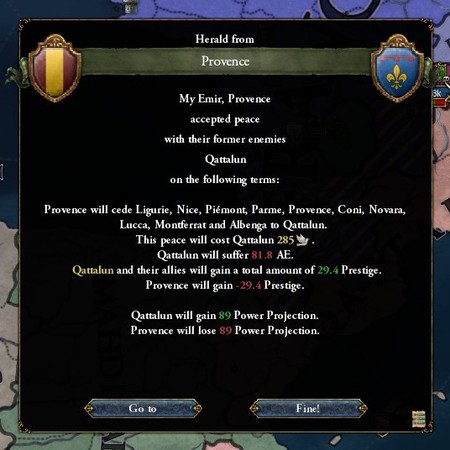
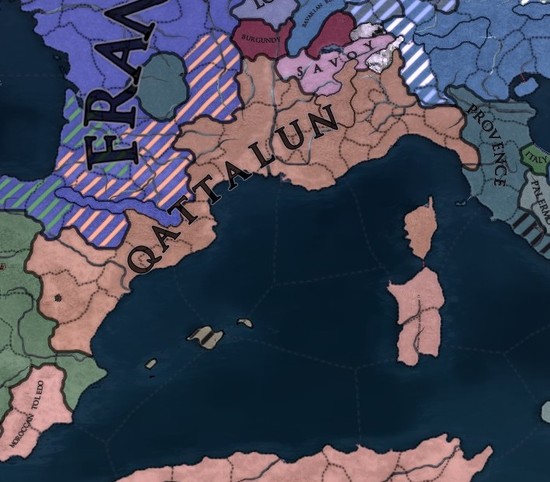
This victory instantly turned Sahim Tirruni into a hero all across Catalonia (and the rest of Iberia, in truth). Eager to take advantage of this newfound political power, Sahim Tirruni rushed back to address the Shura in Barshaluna, where he declared himself Dictator over all of Qattalun, along with its conquered territories.
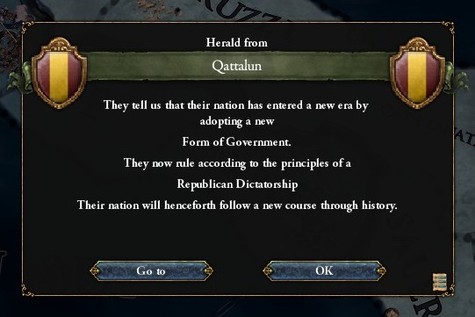
Tirruni was met with immediate opposition in the assembly, of course - but he was still beloved and adored by the people, and it was the people who put him in power, so the revolutionary general simply put the matter to a plebiscite. And as expected, more than 99% of the eligible voting population approved the new constitution, with Tirruni formally declared Dictator before the end of the year.
Sahim was very careful to avoid using the titles ‘sultan’ or ‘emperor’, however, for obvious reasons. And at least at its inception, Tirruni’s regime certainly wasn’t a traditional monarchy, with the dictator instead using his position to implement far-reaching reforms that developed and radicalised every aspect of the government. Before long, Tirruni was surrounded only by his ardent supporters, with everyone else weeded out and executed as traitors to the revolution.
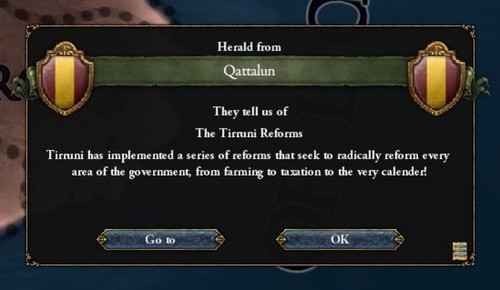
Whatever else that can be said of him, however, Sahim Tirruni’s prowess on the battlefield can’t be denied. And with Bavaria failing in the east, the Majlis were desperate for new allies, so they dispatched a large embassy to meet with the dictator a few months after his victory in Italy.
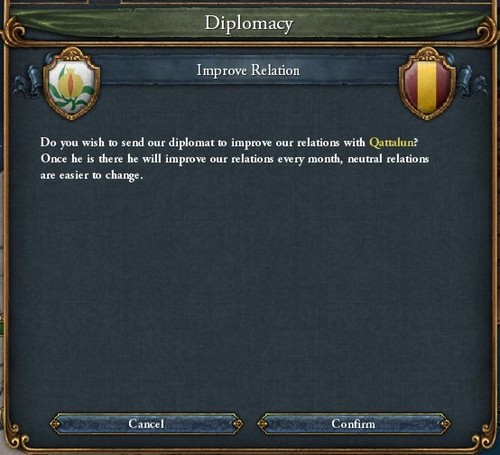
Surrounded by enemies on every side, Tirruni was equally anxious for allies, so he quickly began negotiations to bind the fates of Qadis and Qattalun together. And by March of 1815, an alliance between their two powers was announced, to the relief of both the Majlis and Ibn Timu.
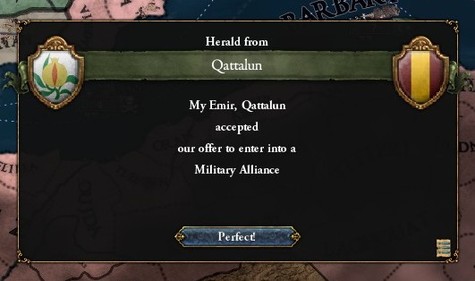
Back in Qadis, meanwhile, the Majlisi Fleet embarked from the capital with instructions to clear Iberian waters of enemy ships. The fleet had taken decades to build, and immediately proved its worth as it annihilated a Russian navy in the Gulf of Cádiz, followed by another crushing victory against a French fleet just off the coast of Finisterre.
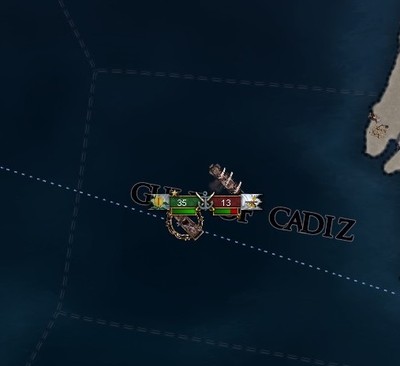
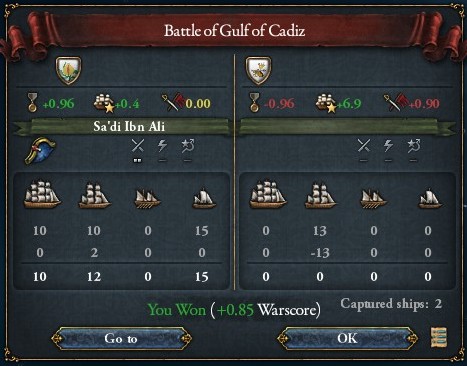
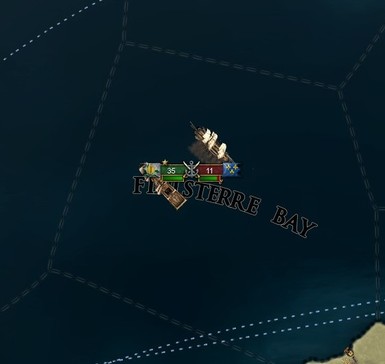
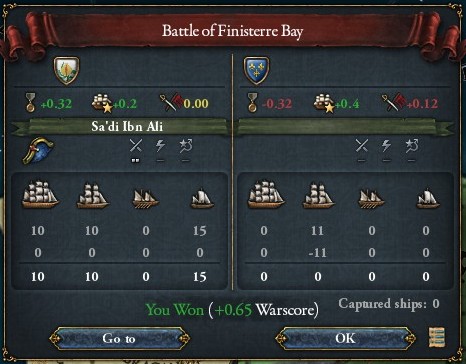
The Majlis also managed to contract a large company of pirates that’d been plaguing the Balearic islands and eastern Iberia, convincing them to augment the Majlisi Fleet and attack French and German merchant shipping instead, splitting the plunder amongst them.
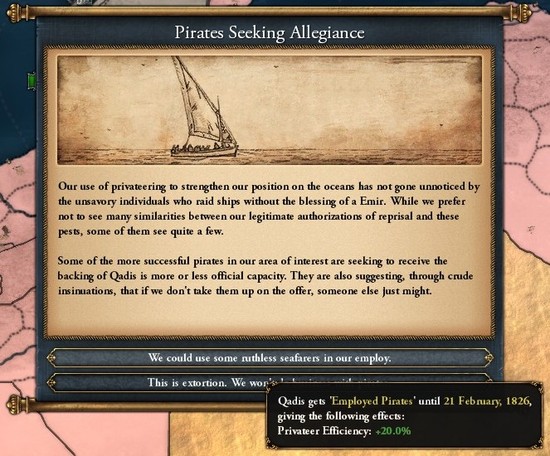
Further north, meanwhile, Ibn Timu was finally ready to launch another campaign. He’d manage to recover the losses suffered by the Majlisi Guard, recruiting and training thousands of new soldiers over the past two years. Officers and tacticians were also sent over from Barshaluna, with orders from Tirruni to help arm the Majlisi Guard with newer and more accurate weaponry, as well as train them in the tactics dominating the Revolutionary Wars.
Ibn Timu was all too happy to see the military reformed, though he did all he could to ensure that it was him who was still in supreme command - he would not become a vassal to Tirruni’s burgeoning empire.
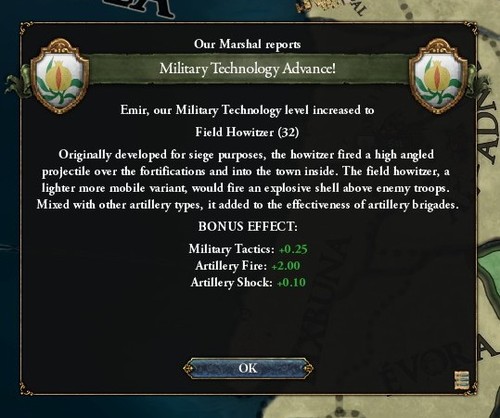
Thus, by the end of 1815, the Majlisi Guard was back to full strength and Ibn Timu was ready to launch another campaign. By personally meeting with his troops and involving his officers in formulating future plans, the Grand Vizier slowly managed to win back the loyalties of his commanders and apprentices, who were now eager to take the fight to the north, see the French humbled and avenge their humiliating defeats.
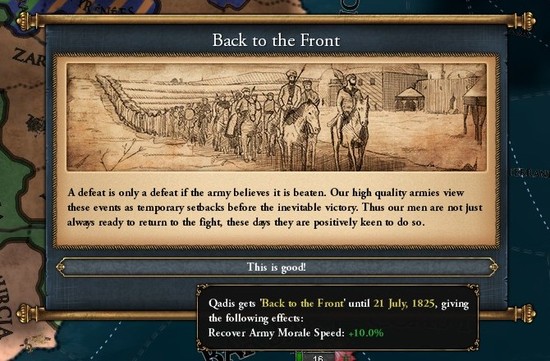
Ibn Timu’s last campaign began early in 1816, marching across the length of Iberia and securing access across occupied France, before laying siege to Poitou for the fourth time.
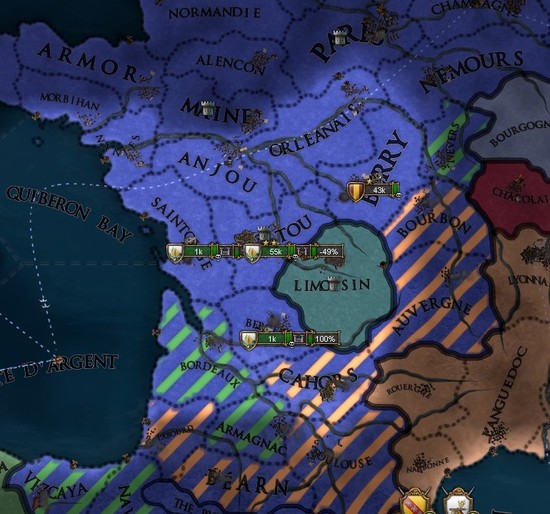
And inevitably, the relief forces quickly began making their way towards the fortress. Ibn Timu had been expecting exactly that, and with his scouts reporting that over 100,000 coalition forces were on the march, the Grand Vizier began fortifying his camps and preparing to engage them. He left a small contingent of his army to continue the siege of Poitou and hid away another detachment in the nearby woods, whilst the rest turned northward to face the oncoming armies.
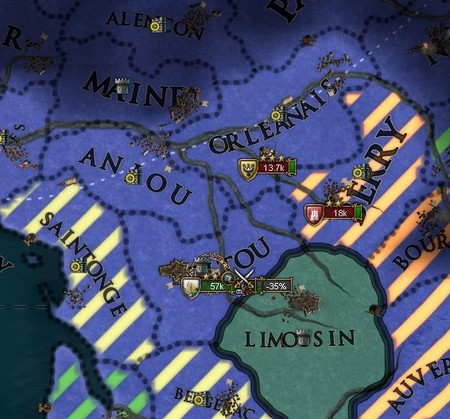
The battle of Poitou, which would live on for centuries in chronicles and poems alike, began with 30,000 Germans engaging the Majlisi Guard just below the walls of the fortress. Expecting a divided and shattered force, the German army was taken by surprise when the Andalusi eagerly met them with guns raised and artillery blazing, with the Majlisi Guard throwing them back after just four hours of thick fighting.
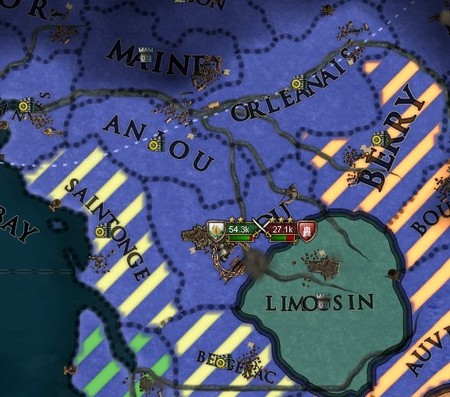
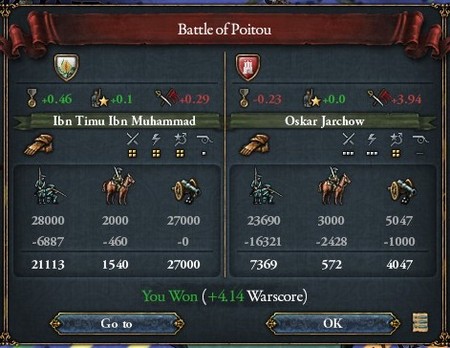
Leaving the Andalusi with little time to rest, another German army arrived scarcely an hour later, this one led by Duke August-Wilhelm of Brunswick. The two sides engaged a scant few miles from Poitou, with Ibn Timu utilising Tirruni’s novel tactics to barrage the enemy centre whilst his flanks closed in on them from either side, completing the encirclement when his hidden contingent of cavalry burst from the woods and attacked the Germans at the rear.
And less than two hours later, almost 20,000 dead Germans littered the battlefield, with another 10,000 chained and on the march towards the prisoner camps further south. The Duke of Brunswick managed to escape, however, fleeing with his highest-ranking officers once the battle turned against him.
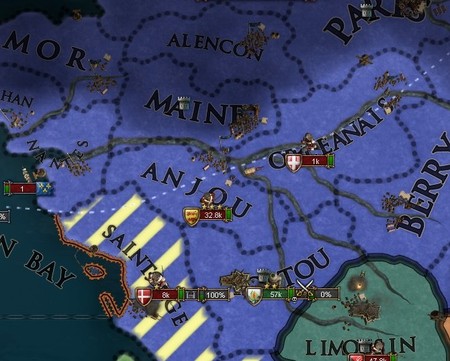
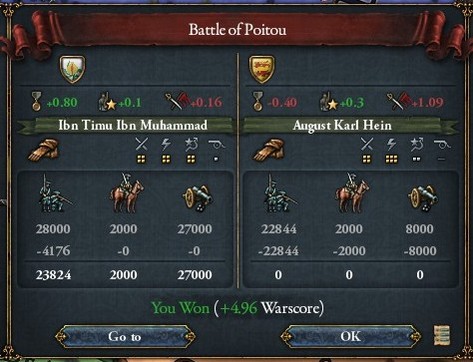
A third army appeared a few hours after that, blindly rushing onto the battlefield in a futile effort to reinforce the struggle. Ibn Timu quickly had the small force surrounded and crushed, simply adding more bodies to the already-considerable mountains of dead.
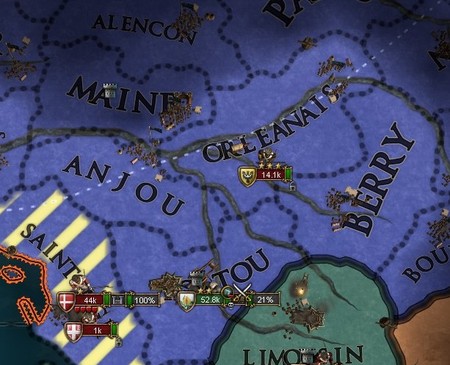
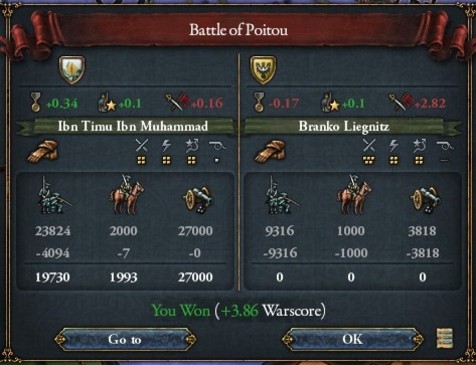
And finally, a fourth army arrived shortly afterwards, this time numbering 20,000 and consisting of the united Hamburg-Franconia-Burgundy forces. Like the previous three battles, this one also ended in crushing victory for the Majlisi Guard, with all 20,000 soldiers killed or captured over the course of seven bloody hours.
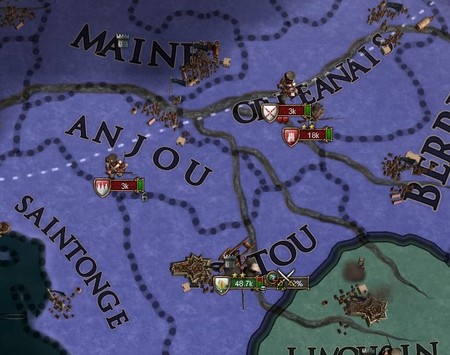
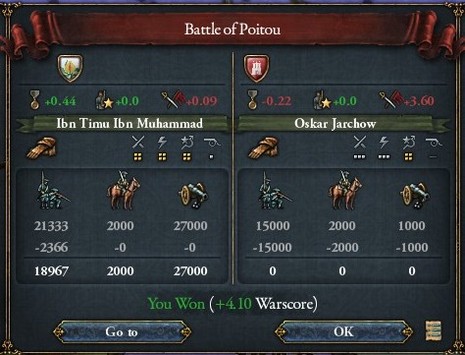
With that, the battle of Poitou came to an end, with a grand total of 100,000 Germans slaughtered or imprisoned over the course of two long days. Marking the high point of Ibn Timu’s military career, the Grand Vizier immediately turned his guns and his attention back to Poitou, determined to capture the fortress.
The garrison held out for another eight more months before finally succumbing to hunger and disease, but once the fortress was delivered to Ibn Timu, the gates into northern France were thrust wide open.
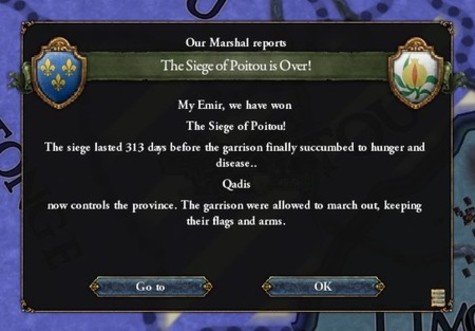
As Andalusi forces began pouring northward, however, the Bavarians were being met with disastrous defeat after defeat. Savoy, Charolais, Lothringen, Frankfurt, Nassau, Ulm - all of these were sites of major Revolutionary defeats over the course of 1816, only further plunging the country into chaos and disarray.
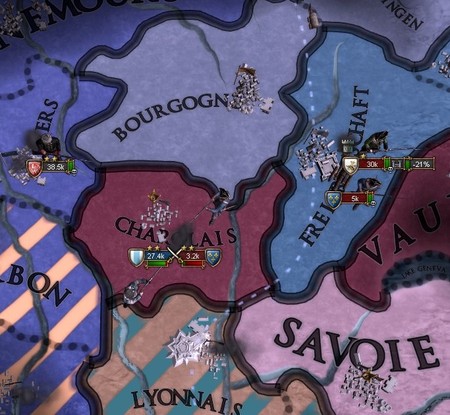
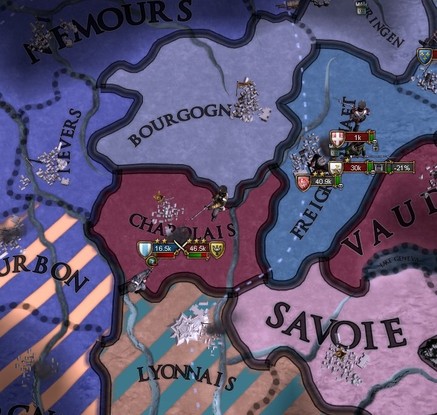
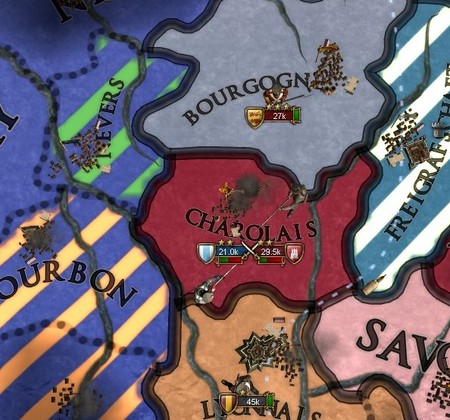
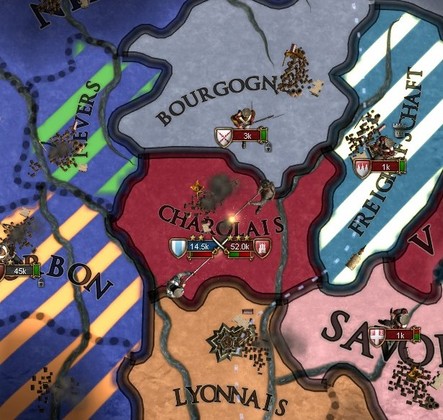
Thus, by the end of the year, large parts of Bavaria were lost to the monarchist coalition. Only a small circle of fortresses surrounding München and northern Italy remained in Revolutionary hands, but with the Smolenskian armies inching closer to the capital with every passing day, that circle was shrinking all too quickly.
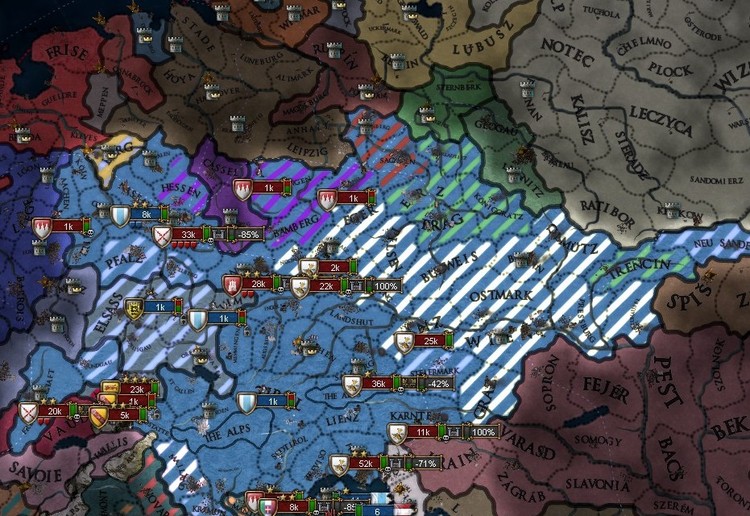
Back in France, meanwhile, news reached Ibn Timu of rising unrest in the Majlis’ Iberian possessions. Harshly taxed and mercilessly conscripted, the peasantry were growing more desperate and more rebellious, with the Majlis now legitimately fearing a revolutionary uprising.
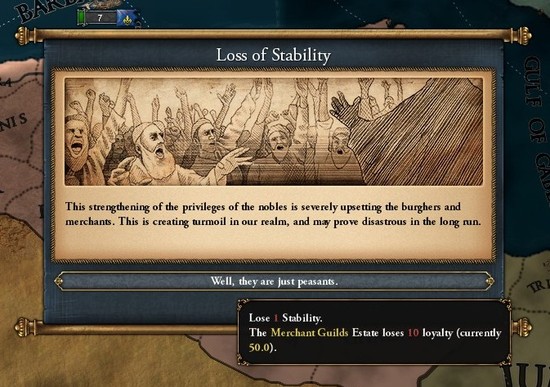
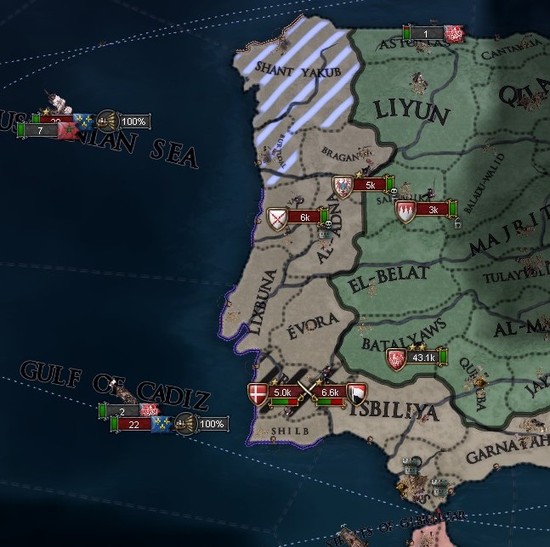
Ibn Timu had only just won the battle of Poitou, however, and he wasn’t going to surrender all of his gains just to deal with some unruly peasants. Instead, he led the Majlisi Guard northward and lay siege to the fortress of Maine - a small, primitive castle that stood no chance against modern artillery. Maine fell within a month, and with that, the road to Paris lay open.
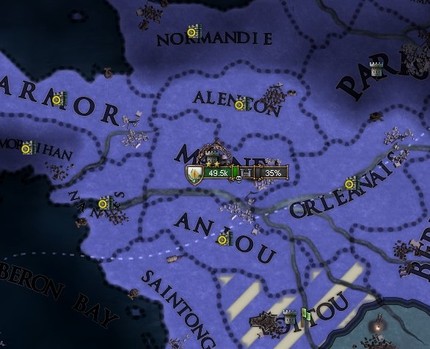
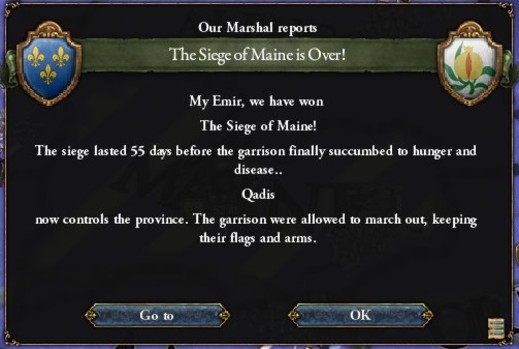
Paris was one of the major symbols of the monarchist cause, and its fall would surely deal them a stinging defeat and earn Ibn Timu lasting fame. Determined to see his ambitions realised, the Grand Vizier began the march towards the French capital, quickly surrounding and crushing a small German force sent to stymie his advance.
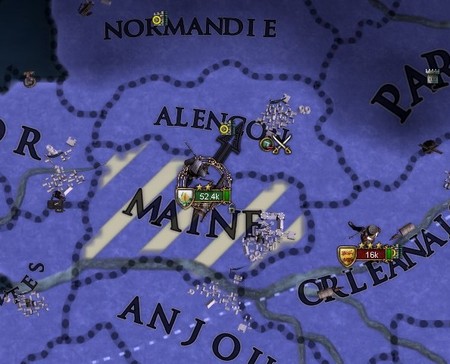
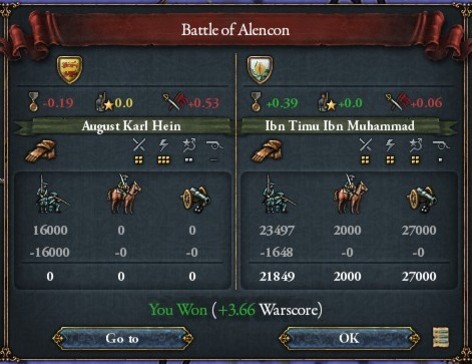
The Queen-Regent and the young heiress to France were forced to flee their capital as the Majlisi Guard advanced, escaping to Hanover, one of the larger German cities. Ibn Timu quickly brought the city to siege, surprised to find that Paris had outdated fortifications - perhaps King Adhémar had never considered an invading force getting so far as to besiege his capital.
If so, Ibn Timu would quickly prove that a foolish choice. Artillery tore at the walls of Paris for weeks without end, finally forcing a breach after almost two months of constant barrage. The Majlisi Guard poured into the breach and rampaged through the city, looting and pillaging it for all its worth, whilst a smaller contingent pushed straight towards the citadel.
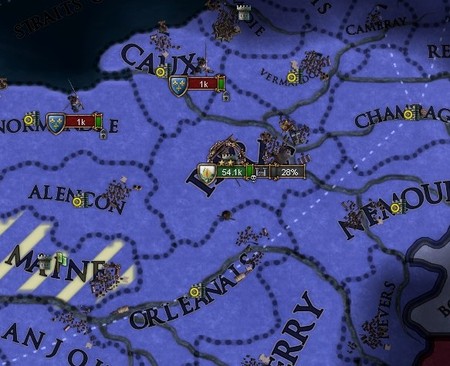
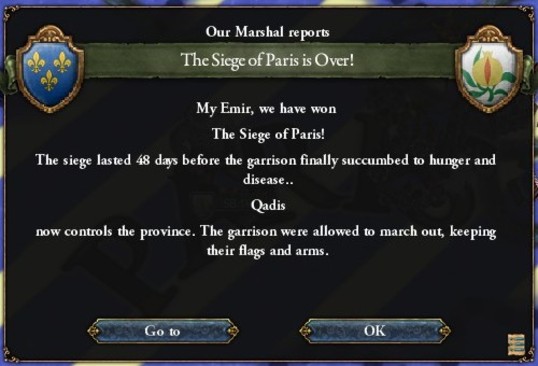
News of the fall of Paris quickly spread through Europe from there, and with Queen Aliç doing all she could to rouse support in Germany, countless monarchist armies were sent westward to try and recapture the city. Ibn Timu was all too happy to deal with the divided forces sent to oust him, engaging and crushing two separate armies over the course of a week.
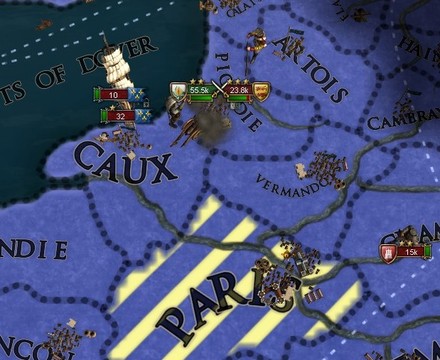
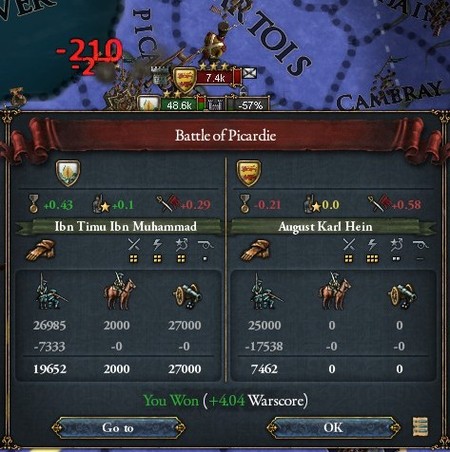
In the east, however, the defense of the revolution went from bad to worse. Smolenskian forces had managed to penetrate the line of fortresses defending München, laying siege to the capital of Bavaria and sending the city into frenzy, with riots and revolts becoming an hourly occurrence as dozens of Consuls were named and replaced and deposed and executed in quick succession.
The city fell after the national assembly opted to surrender, hoping their lives might be spared. The Tsar was not so merciful as that, unleashing his legions to rape and sack their way through München, murdering every last radical they could get their hands on. Within a day, almost the entirety of the National Assembly that had founded and ruled the Bavarian Republic for decades were dead.
And with the Revolutionary armies destroyed and their coffers bare, there would be no coming back from this.
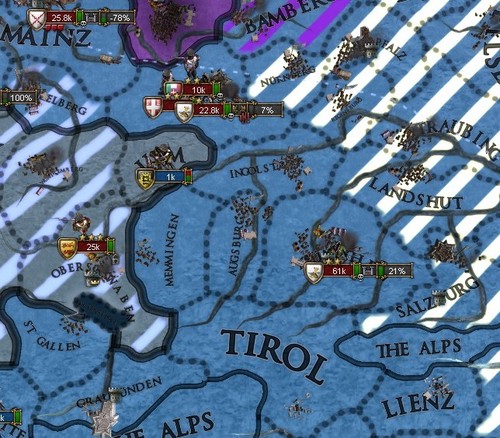
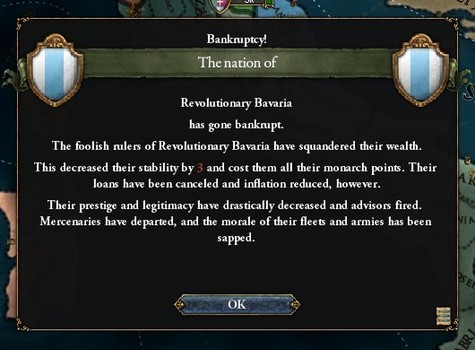
Further west, meanwhile, the Queen-Regent of France met with a series of diplomats from Qurtubah and Barshaluna. After weeks of negotiation, peace between the three nations was finally declared, largely closing the southern theatre and leaving France only embroiled in the Coalition War.
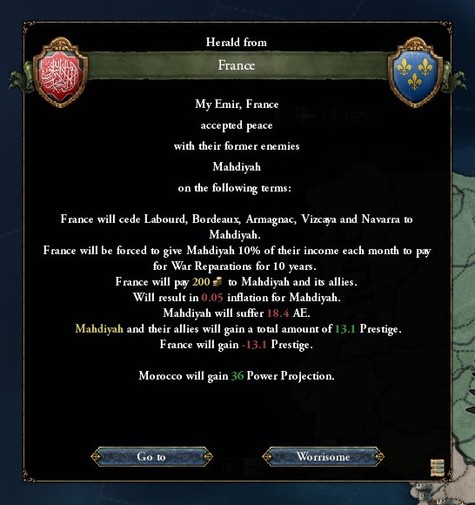
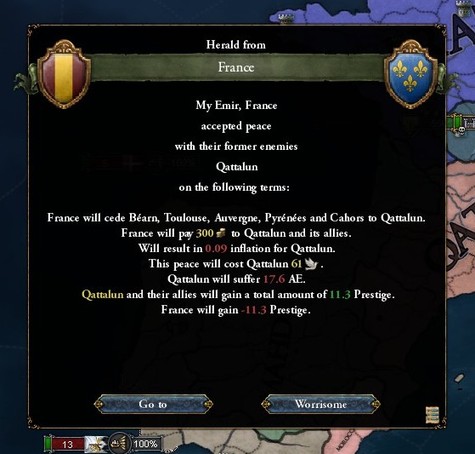
The outcome of these negotiations were not favourable to the French, needless to say. The successor states of al-Andalus now swept across Aquitaine and Occitania, with the kingdom of France restricted to its northern half, and forced to pay hefty war indemnities to both powers.
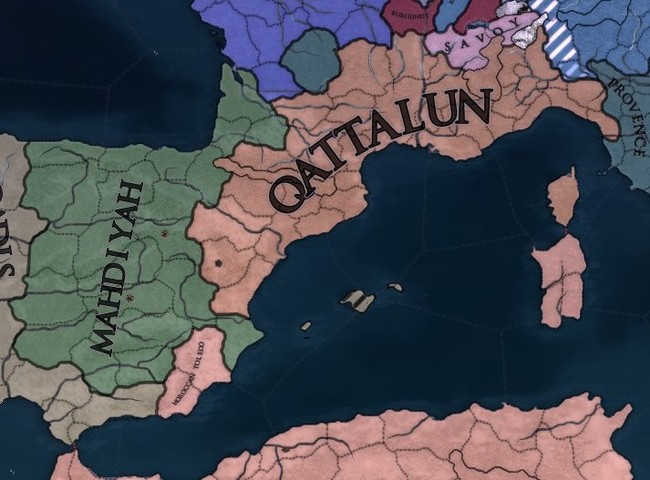
Of the two Muslim powers, Qattalun had certainly emerged with the richer spoils. Sahim Tirruni marched back to a hero’s welcome in Barshaluna, idolised and worshipped by every man, woman and child in the city.
And it was then and there, before the thronging crowds of Barshaluna, that Tirruni declared himself "Sultan of Sultans" and "Emperor of Europe". Lofty claims, but with his empire now stretching from Iberia to Italy, and the traditional Andalusi rivals utterly destroyed, there was little stopping him from becoming exactly that.
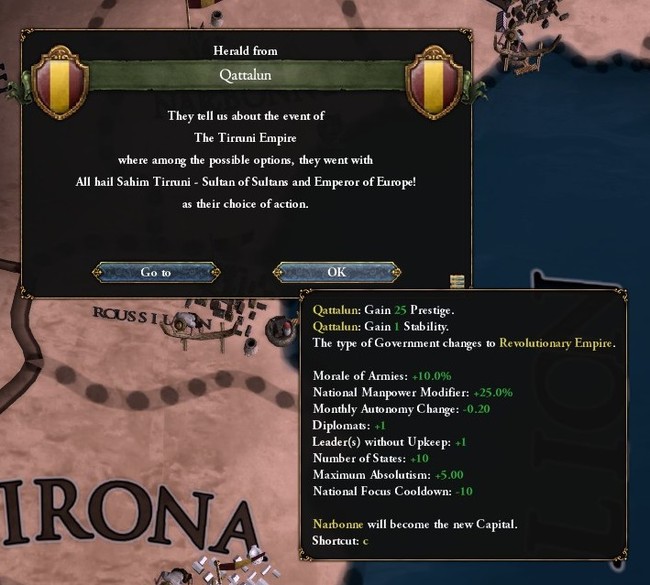
Once again, however, Tirruni showcased his devotion to revolutionary ideals by declaring that religion would have no place in his empire. Instead, he founded the Cult of Reason, a state-sponsored atheistic religion that would usurp the role that the Muslim ulema and Christian clergy once had in Europe.
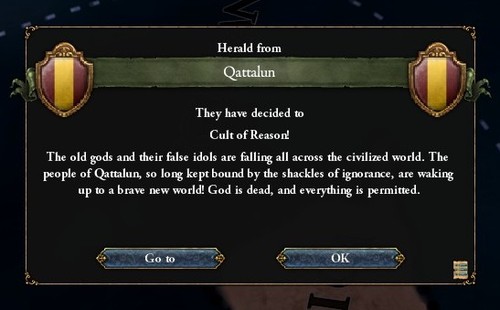
And to unite the Muslim and Christian halves of his empire, Tirruni went on to proclaim a new capital - Narbuna. Contracting architects and builders to remodel the city, investing entire fortunes into new public works and monuments, and forcibly relocating thousands of peasants to settle the city, Tirruni vowed to one day see Narbuna rival Qadis in the south and Paris in the north as the greatest city in the world.
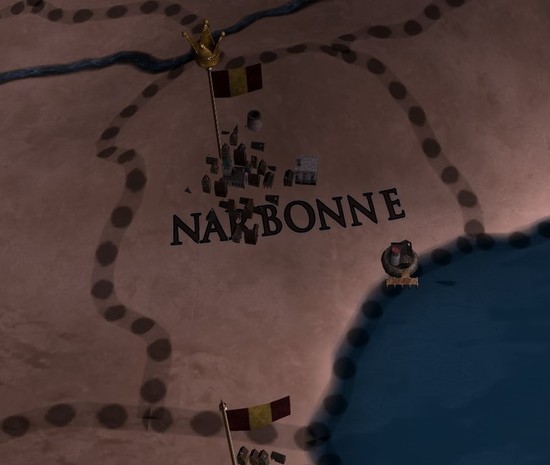
Whilst celebrations and festivities were held throughout Qattalun - or, as it soon came to be called, the Tirruni Empire - in honour of the Dictator’s successes, the rapid expansion of this new revolutionary state quickly attracted the ire of surrounding states. And before long, yet another coalition began forming, desperate and determined to crush the ideals of the revolution once and for all.
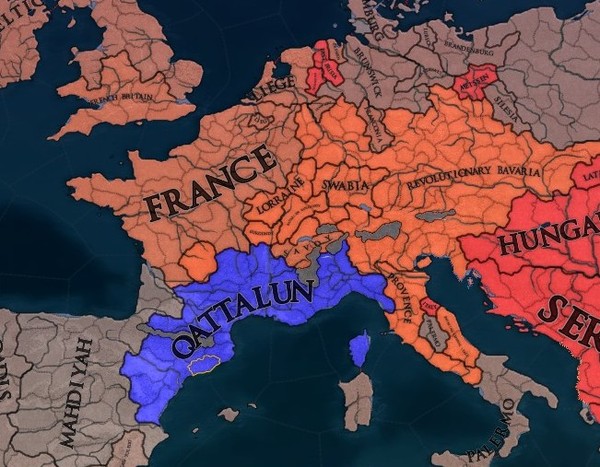
Whilst all this was happening further south, Ibn Timu was preoccupied with meeting and defeating the countless armies sent to oust him from Paris. Between April of 1816 and March of 1818, the Grand Vizier crushed coalition forces in no less than six separate engagements, four of which involved almost a hundred thousand soldiers clashing on the battlefield.
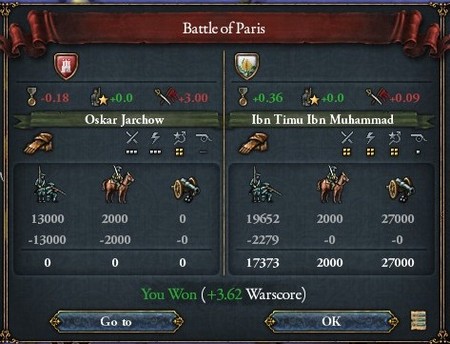
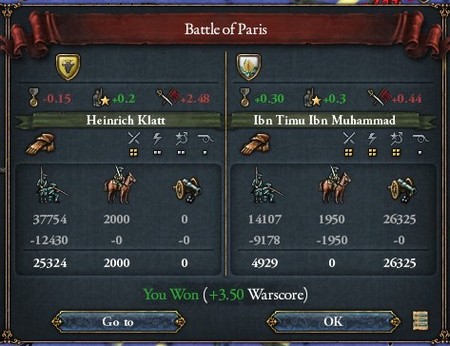
This was all a futile effort, however, serving only to further the ego of Ibn Timu - which may well be why he kept going at it. He enjoyed testing his abilities against the Germans, but whilst he was busy serving his own interests, large stretches of Majlisi Iberia was quickly falling to a foreign invasion by the French.
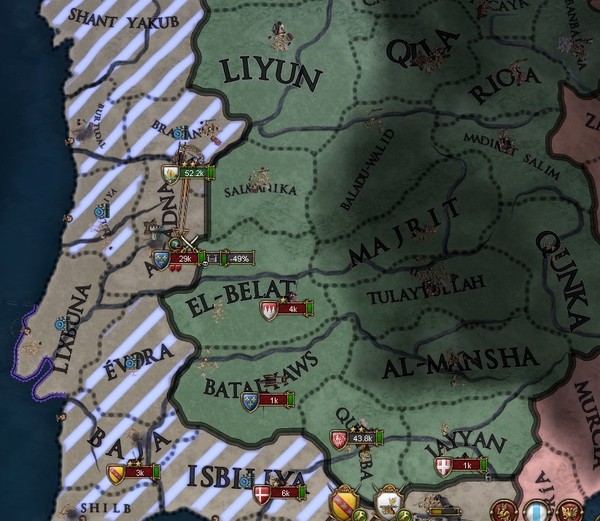
Whilst Ibn Timu was leading an expedition to test the defenses of Picardie, a coalition army led by Duke Wilhelm of Brunswick lay siege to the French capital. The Grand Vizier rushed back with the Majlisi Guard behind him, quick to engage the German force just below the walls of Paris.
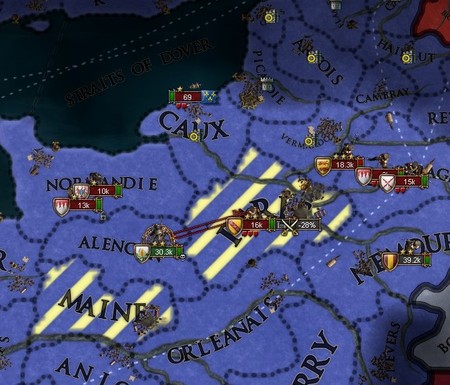
This battle would not end on a happy note, however. The Majlisi Guard were tired after a decade of campaigning in foreign lands, and the coalition forces had learnt from their past mistakes, quickly turning the battlefield into a bloodbath as tens of thousands of reinforcements joined the fray over the next few hours.
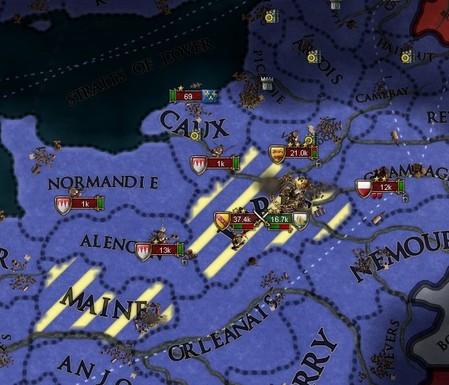
And after half a day of heavy fighting, it was the Andalusi who were forced to fall back, leaving Paris to be surrounded and besieged whilst the Majlisi Guard retreated to Poitou.
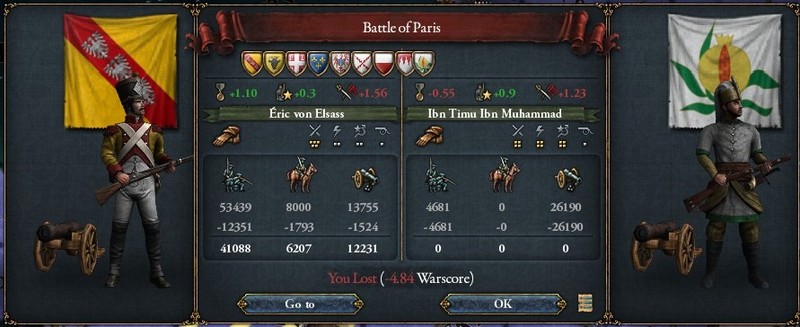
With their armies reduced to a husk and its Iberian territories suffering under brutal occupation, the Majlis finally sent envoys to make peace with the coalition leaders in Smolensk. The negotiations didn’t last long, with Qadis surrendering its captured territories in France in return for its lost territories in Iberia, thus ending the war in a status quo ante bellum.
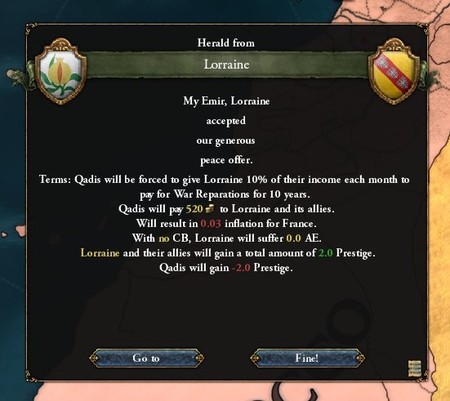
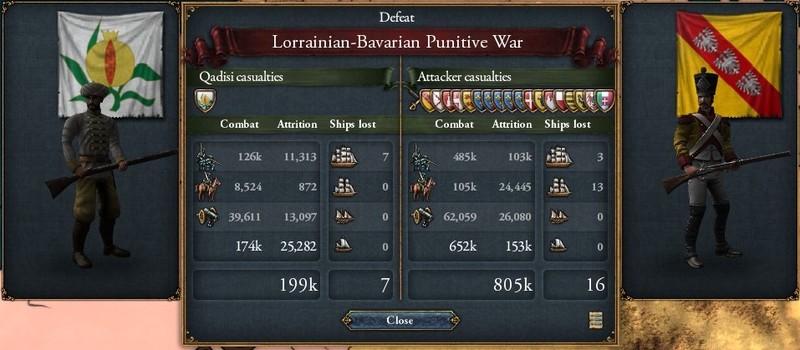
Losses in the Majlisi-Monarchist theatre of the war.
And mere days later, the War of the Second Coalition as a whole came to an end with the Peace of Kraków. The interests of Smolensk and France had dominated the congress, so first on the agenda was the dissolution of the Revolutionary Regime of Bavaria. Once the revolutionary leaders had been hunted down and executed, a member of the deposed Goði dynasty was invited to rule over the reinstated Archduchy of Bavaria, albeit much smaller and weaker than it’d previously been.
In addition to this, the Holy Roman Empire was also formally dissolved during the conference, with title of Emperor (which had traditionally been associated with the Goði dynasty) not restored to the Archduke.
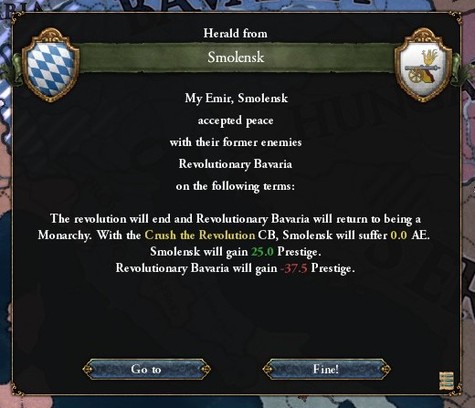
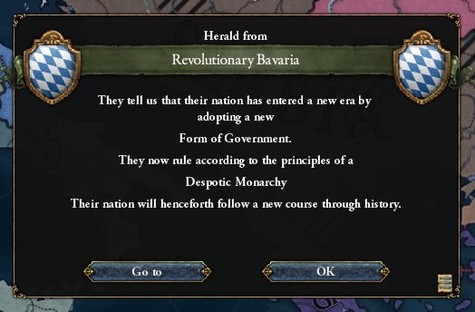
Next up was the partition of the Bavarian Republic, which had swept across the southern half of Germany at its peak. Determined to never again allow such a large power to rise in Germany, the leaders of the coalition forced Bavaria to release large parts of its conquered territories into independent monarchies.
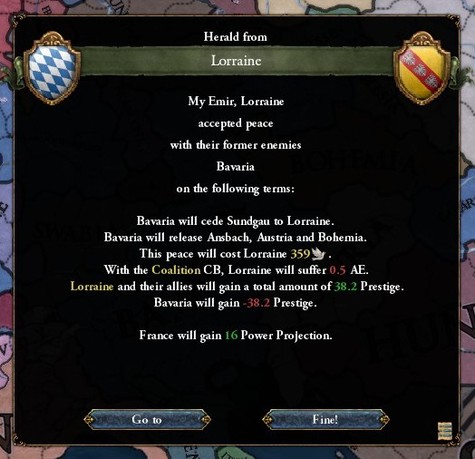
As a result, the map of Central Europe was utterly changed by the end of 1820. Not only was Austria, Bohemia, Swabia, Ansbach, and the Rhine all stripped away from Bavaria, but it also lost all of its puppet states and vassals, and was forced to concede vast stretches of land to Smolensk, Brunswick, Lorraine and France.
And it didn’t end there. The monarchs of Smolensk and France met in confidence and added several secret articles to Peace of Kraków, articles that guaranteed Poland and Brandenburg as puppet states under Smolensk, and the Rhine Confederacy as a puppet state under France.
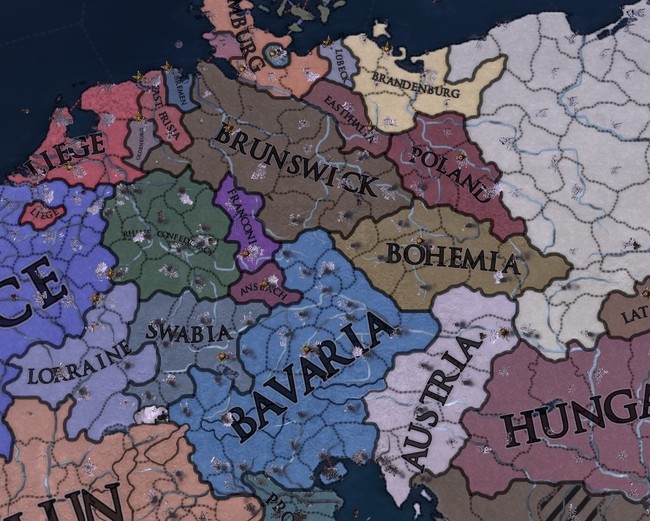
For obvious reasons, Duke August-Wilhelm of Brunswick was furious once this came to light. Angry and humiliated at being outmanoeuvred in the conference, and determined to take a leading role in German affairs, Wilhelm proclaimed the formation of the Kingdom of Hannover - making him the first King to rule in Germany proper for centuries.
Not keen to further antagonise the Germans, both France and Smolensk agreed to recognise his elevation to kingship, though Wilhelm pointedly excluded them from his coronation ceremony later than spring.
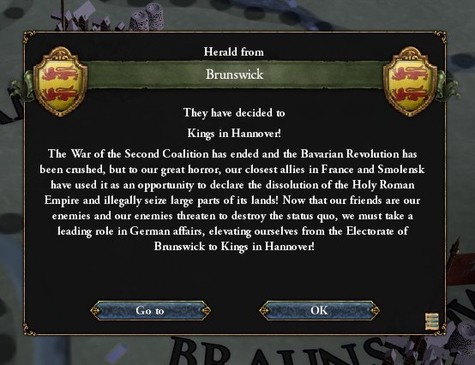
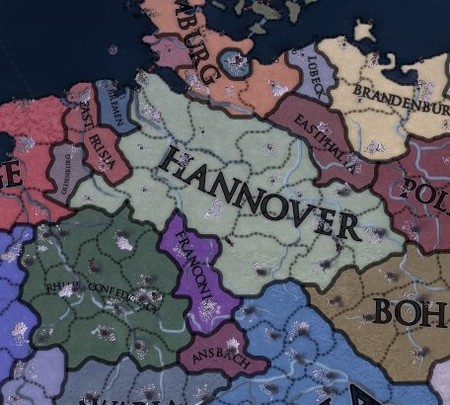
Back in Iberia, meanwhile, Ibn Timu was leading the remnants of the Majlisi Guard back to Qadis. Progress was slow and unenthusiastic, however, as the Grand Vizier himself was deflated and dispirited, crushed after having been humbled outside the walls of Paris. In his misery, Ibn Timu turned to alcohol and women to numb his pains, hosting lavishly decadent parties at every city he passed on his route south.
Whilst resting at Porto, however, Ibn Timu was suddenly caught with a dire illness. Forced to retire to his sheets, the next few days passed slowly as the general’s condition slipped from bad to worse, unable to even open his eyes by the end of the week.
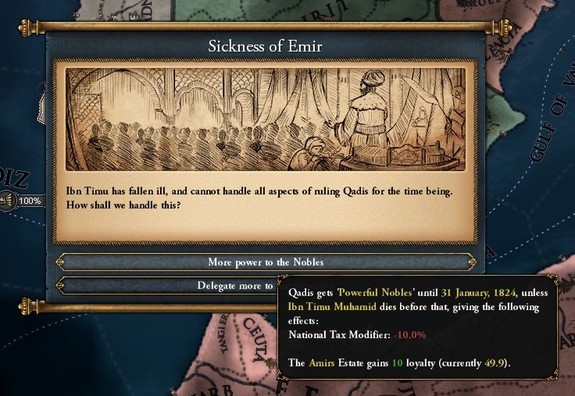
Many would later claim that Ibn Timu had been so crushingly depressed that he had resorted to poison, and whilst some of his closest friends agreed that he had drunk poison, their suspicions lay with assassins in the Majlis al-Shura. Whatever the cause, the third Grand Vizier of the Majlis passed away late in December of 1820. And with his dying words, he passed leadership of the Majlisi Guard on to his closest officer and friend - Raed al-Zulfiqar.
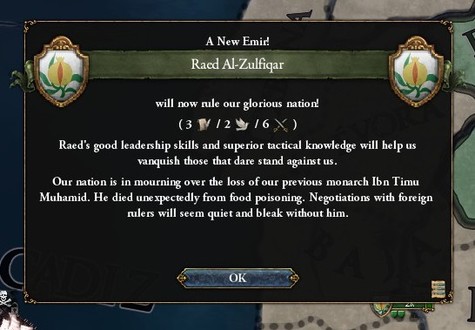
Word of Ibn Timu’s death quickly reached Qadis, where the Majlis wasted no time in celebrating the ‘death of the tyrant’. Others saw his death as an opportunity, however, and a widespread revolutionary conspiracy launched a massive revolt in the capital within days of the Grand Vizier’s passing.
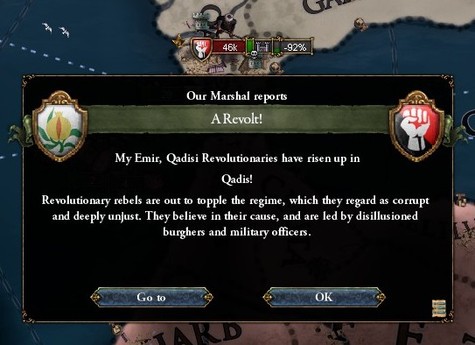
The new commander of the Majlisi Guard quickly took out huge loans, desperately augmenting the remnants of the Majlisi Guard with mercenaries.
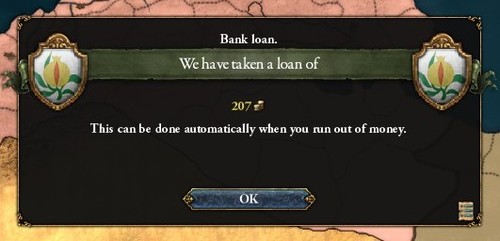
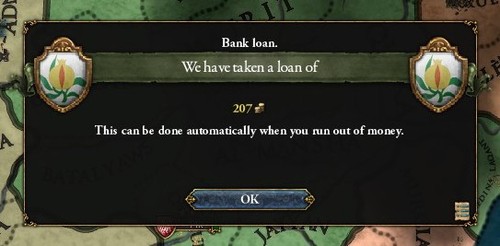
The revolutionaries quickly captured the principal towers and gates in Qadis, however, and had managed to surround large parts of the citadel (where most of the Majlis were cowering). Raed al-Zulfiqar thus rushed to relieve the city despite having smaller numbers and shattered discipline, desperate to stop the city from falling into revolutionary hands.
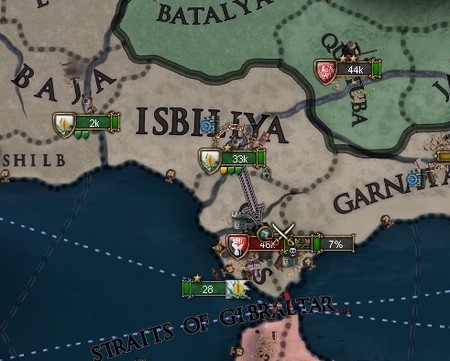
The Majlisi Guard were on the verge of engaging the revolutionaries before the citadel fell, however, with the inflamed peasantry pouring into the fortress. And though they only held the city for a few hours, the revolutionaries took the opportunity to brutally slaughter every member of the Majlis they could get their hands on, declaring the formation of a Revolutionary Republic once the royal palaces had been purged.
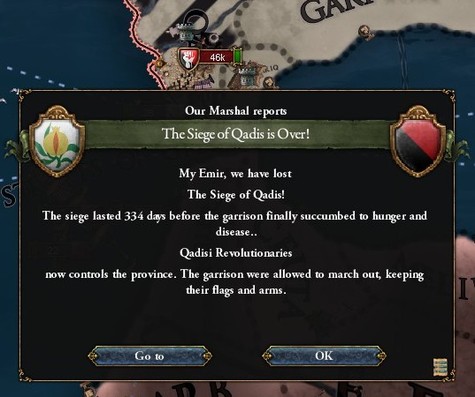
Zulfiqar wouldn’t just let that stand, of course, pouring into the city and engaging the revolutionaries in the narrow streets and alleyways of Qadis. A frenzied battle followed, and despite being numerically superior to Zulfiqar’s forces, the revolutionaries couldn’t match the weaponry of the Majlisi Guard. The battle ended in victory for Zulfiqar, with any revolutionary sympathies crushed along with the radicals themselves.
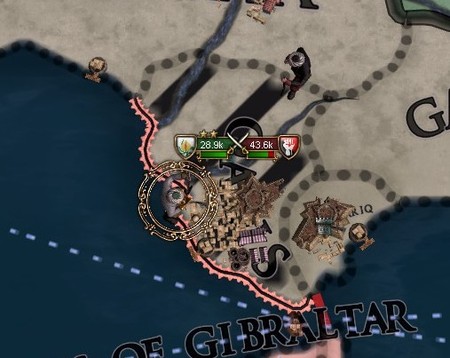
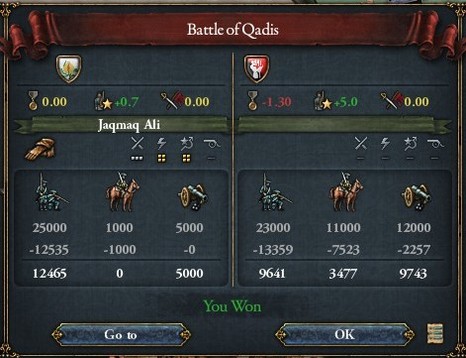
From there, Zulfiqar quickly seized control of the rest of Qadis, recapturing the citadel and reinstating the Majlis al-Shura. The commander was also a clever politician, however, and he took the opportunity to round up and execute many of the surviving members of the Majlis, under the pretence of bargaining with the revolutionaries.
Those that survived this purge were allowed to return to the Majlis, but the assembly was now a shell of its former self, quickly forced to declare Raed al-Zulfiqar the fourth Grand Vizier of Qadis.
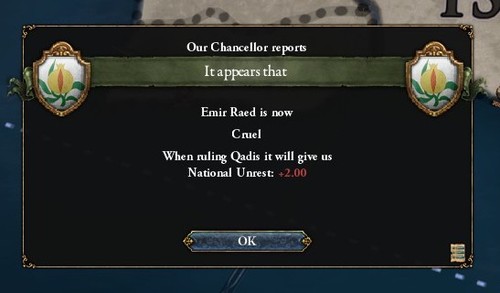
Whilst Zulfiqar seizes control of Qadis once more, however, a far greater struggle breaks out further north. Having massed a powerful league in opposition to his aggressive expansion, the Third Coalition declares war on the Tirruni Empire, expecting an easier war than the endless struggle against Bavaria.
The Revolutionary Wars against Bavaria may have come to an end, but the Tirruni Wars are only just beginning, promising to plunge the entirety of Europe into blood before being sated.
